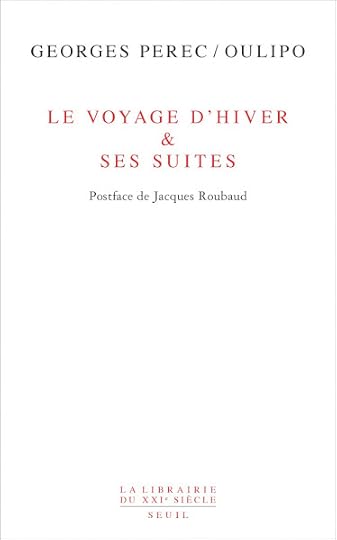Jack Ross's Blog, page 7
June 4, 2023
SF Luminaries: Ray Bradbury
 Ray Bradbury (1920-2012)
Ray Bradbury (1920-2012)As various fans have already pointed out, Stephen King's latest novel Fairy Tale (2022) - despite being overtly dedicated to Edgar Rice Burroughs, Robert E. Howard, and H. P. Lovecraft, also contains a number of covert references to another distinguished predecessor in the horror/fantasy genre: Ray Bradbury.
For one thing, it takes place in a small town called Sentry's Rest, Illinois - which seems like a nod to the mythical Green Town, Illinois, setting for Bradbury's classic novel Something Wicked This Way Comes (1962). The alternate universe of Empis which King's protagonist, Charlie Reade [get it? "Read"] explores also contains a magic carousel, one of the central features of the travelling carnival in Bradbury's own book.
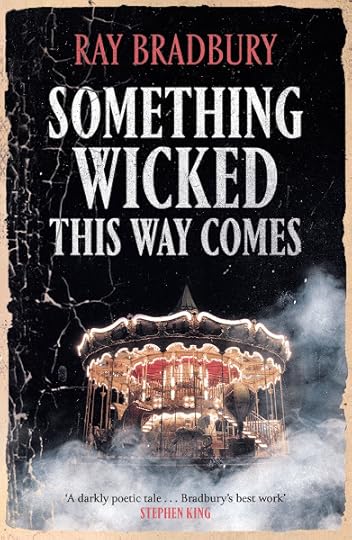 Ray Bradbury: Something Wicked This Way Comes (1962)
Ray Bradbury: Something Wicked This Way Comes (1962)Mind you, once you start looking for parallels with other fantasy writers, King's story threatens to fall apart under the sheer weight of allusion. Readers have postulated links with William Goldman's The Princess Bride; Lord Dunsany's realm of Elfland, "beyond the fields we know"; not to mention numerous echoes of King's own Dark Tower saga.
Bradbury is special for him, though. As he himself once put it: "without Ray Bradbury, there is no Stephen King." Or, as he wrote on hearing the news of Bradbury's death in 2012, at the age of 91:
Ray Bradbury wrote three great novels and three hundred great stories. One of the latter was called 'A Sound of Thunder.' The sound I hear today is the thunder of a giant's footsteps fading away. But the novels and stories remain, in all their resonance and strange beauty.So who exactly was this starry-eyed visonary - this laureate of space and small-town life - and why has he left such a strangely equivocal and contradictory reputation behind him?
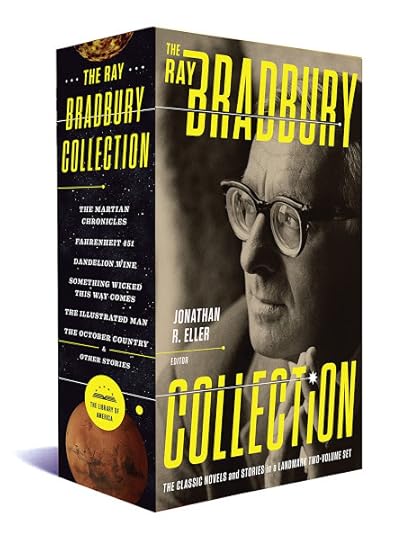 Library of America: The Ray Bradbury Collection (2022)
Library of America: The Ray Bradbury Collection (2022)You know that you've really arrived when they not only reprint your collected works in the canonical Library of America series, but even provide a specially designed slipcase to put them in!
Novels & Story Cycles. Ed. Jonathan R. Eller. The Library of America, 347. [‘The Martian Chronicles’, 1950; ‘Fahrenheit 451’, 1953; ‘Dandelion Wine’, 1957; ‘Something Wicked This Way Comes’, 1962]. New York: Literary Classics of the United States, Inc., 2021.
The Illustrated Man, The October Country & Other Stories. Ed. Jonathan R. Eller. The Library of America, 360. 1951, 1955. New York: Literary Classics of the United States, Inc., 2022.
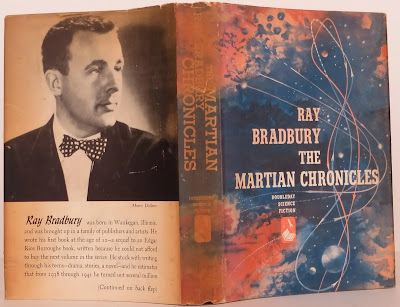 Ray Bradbury: The Martian Chronicles (1950)
Ray Bradbury: The Martian Chronicles (1950)You'll notice, though, that most of the work included in this set is comparatively early - dating roughly from the 1940s to the early 1960s. And even Stephen King claims only three great Bradbury novels among the dozen or so he actually published.
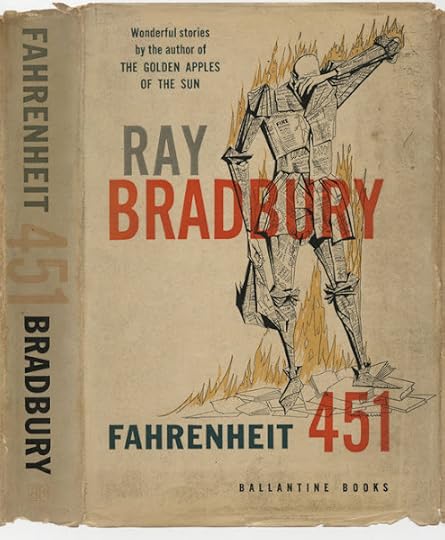 Ray Bradbury: Fahrenheit 451 (1953)
Ray Bradbury: Fahrenheit 451 (1953)There's little doubt that two of the three must be Fahrenheit 451 (1953) and Something Wicked This Way Comes (1962). The third is more debatable: The Martian Chronicles (1950) would be most people's first choice for the honour, but it is technically a 'story-cycle' rather than a novel. That would leave us with Dandelion Wine (1957) - to me almost unbearably saccharine in its evocation of untroubled boyhood, but certainly a book which has its admirers.
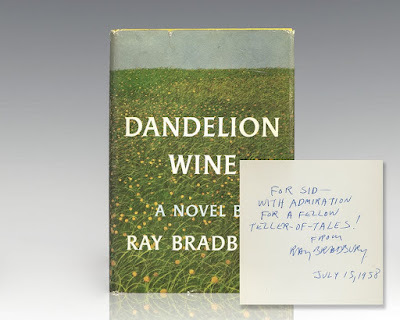 Ray Bradbury: Dandelion Wine (1957)
Ray Bradbury: Dandelion Wine (1957)Are there any other serious candidates? Not really. Ray Bradbury was a writer who peaked comparatively early, with a dazzling series of science fiction and horror short stories published throughout the 1940s and 50s, some of the strongest of which were reprinted in the early collection Dark Carnival, by H. P. Lovecraft's disciple and friend, August Derleth, at his legendary imprint Arkham House.
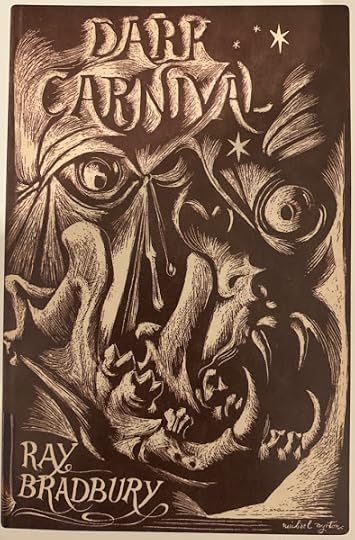 Ray Bradbury: Dark Carnival (1947)
Ray Bradbury: Dark Carnival (1947)Only 15 of the 27 stories in this unrelentingly dark and pitiless collection were reprinted, several in revised versions, in The October Country (1955). As Wikipedia tells it:
For many years, Bradbury did not permit Dark Carnival to be reprinted ... However, a limited edition ... with five extra stories and a new introduction by Bradbury, was printed by Gauntlet Press in 2001.A new paperback edition of this seminal collection is promised for early 2024.
The fact is that it was horror stories such as "The Veldt" (in The Illustrated Man), "The Next in Line" (in Dark Carnival & The October Country), and "Mars is Heaven!" (in The Martian Chronicles) which were responsible for much of Bradbury's early vogue. Cannibalism, live burial, and homicidal children are just a few of his early themes.
So before you go writing him off as an old sentimentalist dreaming of some kind of Tom Sawyer-like childhood paradise in rural Illinois, never forget the dark, Lovecraftian roots behind much of his best work.
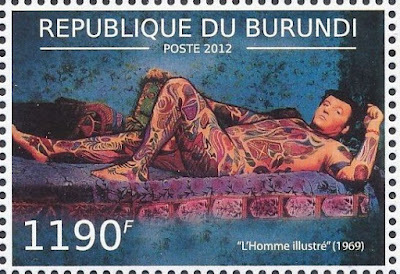 The Illustrated Man (2012)
The Illustrated Man (2012)A couple of his early Martian stories interested me particularly as I reread all the early collections reprinted in the Library of America boxset.
They're entitled (respectively) "Way in the Middle of the Air" [included in early editons of The Martian Chronicles, 1950] - which concerns a mass exodus of African American people to Mars; and "The Other Foot" [included in The Illustrated Man, 1951] - which tells us what happens when the news of the return to Mars of the last few white people left after their latest suicidal war reaches the now exclusively black population of the red planet.
By today's standards both stories sound rather naive and patronising. There's a lot of Huck Finn-style dialect, use of the "n"-word, and other now unacceptable linguistic usages. Both stories are also intensely well-meaning - it's worth noticing that they long predate such civil rights landmarks as the Montgomery Bus Boycott, let alone the compulsory integration of US schools.
And yet, both now read like museum exhibits: Liberal Northern White Attitudes (c.1950). By contrast, his more complex and haunting stories of the time: "Dark They Were, and Golden-Eyed" (1949), for instance - about the gradual possession of an all-American family by the haunting (and haunted?) landscapes and mores of Mars - have a mysterious resonance as powerful now as it was then.
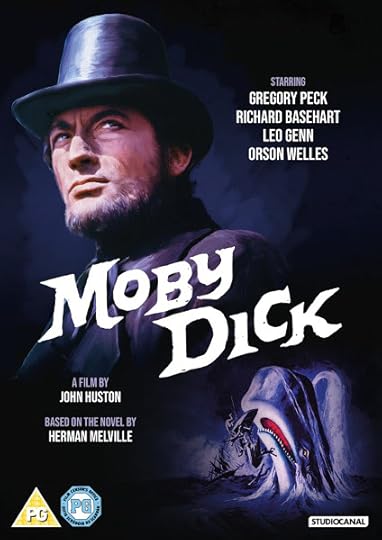 John Huston, dir. Moby Dick (1956)
John Huston, dir. Moby Dick (1956)Perhaps the true turning point for Bradbury was the year he spent working on John Huston's adaptation of Moby Dick. It's not a terrible screenplay - there's a bit too much poetic language in the voice-overs, maybe, but the two of them did a competent enough job at transferring an almost unfilmable novel to the screen.
But Huston's habit of belitting and insulting his collaborators - allegedly (he claimed) to get the best out of them, but actually (it would appear) to indulge his own petty sadism - had a particularly bad effect on the ebullient Bradbury. He wrote a fictionalised version of their encounter in the novel Green Shadows, White Whale , which made it clear that he'd been brooding on the matter for quite some time.
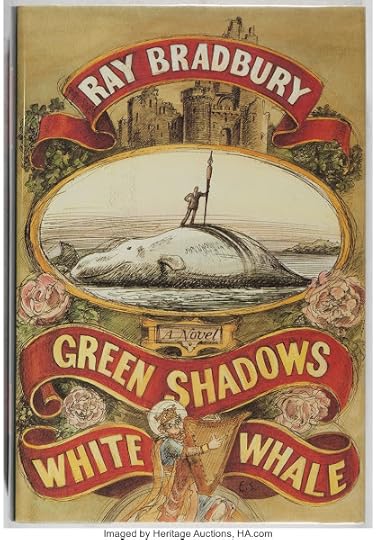 John Huston, dir. Green Shadows, White Whale (1992)
John Huston, dir. Green Shadows, White Whale (1992)It's not that there aren't gems among the later stories - "The Parrot Who Met Papa" (1972), about the search for a legendary parrot alleged to have memorised Hemingway's last novel as a result of his endless rambling monologues in its presence, for instance - but they're pretty few and far between.
Some terrible lapse in self-confidence - or, perhaps, reluctance to indulge the dark side of his nature any further than he'd already done (one of the most prominent themes in Something Wicked This Way Comes) - seems to have kept him largely on the sunny side of the street thereafter. There's a relentless verbosity in his work from the 1970s onwards - occasionally, mercifully, spiked by humour, but mostly a turbid stream of two-bit words and phrases.
He leaves behind, then, a divided legacy: the dark mysteries of his early stories and novels, and the wordy bathos of his later work. As the Library of America has already signalled, there's little doubt which will prevail in the eyes of posterity.
It does leave you wondering, though, just what did Huston (and, for that matter, Herman Melville) do to him in that windy old castle in Ireland? The novel he wrote about it - after, he claimed, having read Katharine Hepburn's account of her own mistreatment at Huston's hands during the making of "The African Queen" (1951): How I Went to Africa With Bogart, Bacall and Huston and Almost Lost My Mind (1987) - is just that: a novel. What really happened to him there we'll never know.
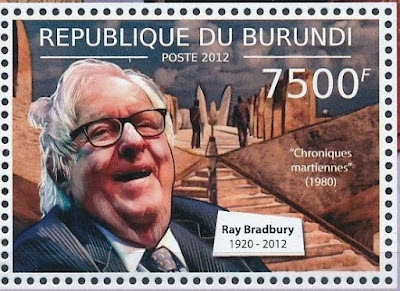 Ray Bradbury Postage Stamp (2012)
Ray Bradbury Postage Stamp (2012)•
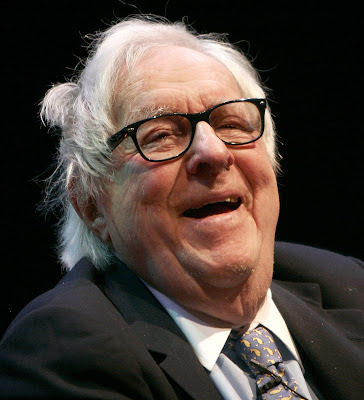 Charley Gallay: Ray Bradbury (2007)
Charley Gallay: Ray Bradbury (2007)Ray Douglas Bradbury
(1920-2012)
Books I own are marked in bold:
Novels:
The Martian Chronicles [aka The Silver Locusts] (1950)The Silver Locusts. 1950. London: Corgi Books, 1969.Fahrenheit 451 (1953)Fahrenheit 451. 1953. London: Corgi Books, 1963.Dandelion Wine (1957)Dandelion Wine. 1957. London: Corgi Books, 1972.Something Wicked This Way Comes (1962)Something Wicked This Way Comes. 1962. London: Corgi Books, 1969.The Halloween Tree (1972)The Halloween Tree. 1972. Illustrated by Joseph Mugnaini. London: Hart-Davis, MacGibbon, 1973.The Novels of Ray Bradbury (1984)The Novels of Ray Bradbury: Fahrenheit 451, Dandelion Wine, Something Wicked This Way Comes. 1953, 1957, 1962. London: Book Club Associates, by arrangement with Granada Publishing Limited, 1984.Death is a Lonely Business (1985)A Graveyard for Lunatics (1990)Green Shadows, White Whale (1992)From the Dust Returned (2001)Let's All Kill Constance (2002)Farewell Summer (2006)Novels & Story Cycles. Library of America (2021)Novels & Story Cycles. Ed. Jonathan R. Eller. The Library of America, 347. [‘The Martian Chronicles’, 1950; ‘Fahrenheit 451’, 1953; ‘Dandelion Wine’, 1957; ‘Something Wicked This Way Comes’, 1962]. New York: Literary Classics of the United States, Inc., 2021.
Collections:
Dark Carnival (1947)The HomecomingSkeletonThe JarThe LakeThe MaidenThe TombstoneThe Smiling PeopleThe EmissaryThe TravelerThe Small AssassinThe CrowdReunionThe HandlerThe CoffinInterimJack-in-the-BoxThe ScytheLet's Play 'Poison'Uncle EinarThe WindThe NightThere Was An Old WomanThe Dead ManThe Man UpstairsThe Night SetsCisternThe Next In Line The Illustrated Man (1951)The VeldtKaleidoscopeThe Other FootThe HighwayThe ManThe Long RainThe Rocket ManThe Fire BalloonsThe Last Night of the WorldThe ExilesNo Particular Night or MorningThe Fox and the ForestThe VisitorThe Concrete MixerMarionettes, Inc.The CityZero HourThe Rocket The Illustrated Man. 1951. Corgi SF Collector’s Library. London: Corgi Books, 1972.The Golden Apples of the Sun (1953)The Golden Apples of the Sun. 1953. Corgi SF Collector’s Library. London: Corgi Books, 1973.The October Country (1955)The DwarfThe Next in LineThe Watchful Poker Chip of H. MatisseSkeletonThe JarThe LakeThe EmissaryTouched With FireThe Small AssassinThe CrowdJack-in-the-BoxThe ScytheUncle EinarThe WindThe Man UpstairsThere Was an Old WomanThe CisternHomecomingThe Wonderful Death of Dudley Stone The October Country. 1955. London: New English Library, 1973. A Medicine for Melancholy (1959)The Day It Rained Forever (1959)The Day It Rained Forever. 1959. Harmondsworth: Penguin, 1969.The Small Assassin (1962)The Small Assassin. 1962. London: New English Library, 1970.R is for Rocket (1962)R is for Rocket. 1962. London: Pan Books, 1972.The Machineries of Joy (1964)The Machineries of Joy. 1964. London: Panther Books, 1977.The Autumn People (1965)The Vintage Bradbury (1965)Tomorrow Midnight (1966)S is for Space (1966)S is for Space. 1966. New York: Bantam Books, 1978.Twice 22 (1966)I Sing The Body Electric (1969)I Sing The Body Electric! 1969. London: Corgi Books, 1972.Ray Bradbury (1975)Long After Midnight (1976)Long After Midnight. 1976. London: Panther Books, 1978.The Mummies of Guanajuato (1978)The Fog Horn & Other Stories (1979)One Timeless Spring (1980)The Last Circus and the Electrocution (1980)The Stories of Ray Bradbury (1980)The Night (1946)Homecoming (1946)Uncle Einar (1947)The Traveler (1946)The Lake (1944)The Coffin (1947)The Crowd (1943)The Scythe (1943)There Was an Old Woman (1944)There Will Come Soft Rains (1950)Mars Is Heaven! (1948)The Silent Towns (1949)The Earth Men (1948)The Off Season (1948)The Million-Year Picnic (1946)The Fox and the Forest (1950)Kaleidoscope (1949)The Rocket Man (1951)Marionettes, Inc. (1949)No Particular Night or Morning (1951)The City (1950)The Fire Balloons (1951)The Last Night of the World (1951)The Veldt (1950)The Long Rain (1950)The Great Fire (1949)The Wilderness (1952)A Sound of Thunder (1952)The Murderer (1953)The April Witch (1952)Invisible Boy (1945)The Golden Kite, The Silver Wind (1953)The Fog Horn (1951)The Big Black and White Game (1945)Embroidery (1951)The Golden Apples of the Sun (1953)Powerhouse (1948)Hail and Farewell (1948)The Great Wide World over There (1952)The Playground (1953)Skeleton (1943)The Man Upstairs (1947)Touched by Fire (1954)The Emissary (1947)The Jar (1944)The Small Assassin (1946)The Next in Line (1947)Jack-in-the-Box (1947)The Leave-Taking (1957)Exorcism (1957)The Happiness Machine (1957)Calling Mexico (1950)The Wonderful Ice Cream Suit (1958)Dark They Were, and Golden-Eyed (1949)The Strawberry Window (1954)A Scent of Sarsaparilla (1953)The Picasso Summer (1957)The Day It Rained Forever (1957)A Medicine for Melancholy (1959)The Shoreline at Sunset (1959)Fever Dream (1959)The Town Where No One Got Off (1958)All Summer in a Day (1954)Frost and Fire (1946)The Anthem Sprinters (1963)And So Died Riabouchinska (1953)Boys! Raise Giant Mushrooms in Your Cellar! (1962)The Vacation (1963)The Illustrated Woman (1961)Some Live Like Lazarus (1960)The Best of All Possible Worlds (1960)The One Who Waits (1949)Tyrannosaurus Rex (1962)The Screaming Woman (1951)The Terrible Conflagration Up at the Place (1969)Night Call, Collect (1949)The Tombling Day (1952)The Haunting of the New (1969)Tomorrow's Child (1948)I Sing the Body Electric! (1969)The Women (1948)The Inspired Chicken Motel (1969)Yes, We'll Gather at the River (1969)Have I Got a Chocolate Bar for You! (1976)A Story of Love (1951)The Parrot Who Met Papa (1972)The October Game (1948)Punishment Without Crime (1950)A Piece of Wood (1952)The Blue Bottle (1950)Long After Midnight (1962)The Utterly Perfect Murder (1971)The Better Part of Wisdom (1976)Interval in Sunlight (1954)The Black Ferris (1948)Farewell Summer (1980)McGillahee's Brat (1970)The Aqueduct (1979)Gotcha! (1978)The End of the Beginning (1956) The Stories of Ray Bradbury. London: Granada, 1981. The Fog Horn and Other Stories (1981)Dinosaur Tales (1983)A Memory of Murder (1984)The Wonderful Death of Dudley Stone (1985)The Toynbee Convector (1988)Classic Stories 1 (1990)Classic Stories 2 (1990)The Parrot Who Met Papa (1991)Selected from Dark They Were, and Golden-Eyed (1991)Quicker Than The Eye (1996)Driving Blind (1997)Ray Bradbury Collected Short Stories (2001)The Playground (2001)Dark Carnival: Limited Edition with Supplemental Materials (2001)One More for the Road (2002)Bradbury Stories: 100 of His Most Celebrated Tales (2003)The Whole Town's SleepingThe RocketSeason of DisbeliefAnd the Rock Cried OutThe Drummer Boy of ShilohThe Beggar on O'Connell BridgeThe Flying MachineHeavy-SetThe First Night of LentLafayette, FarewellRemember Sascha?JuniorThat Woman on the LawnFebruary 1999: YllaBansheeOne for His Lordship, and One for the Road!The Laurel and Hardy Love AffairUnterderseaboat DoktorAnother Fine MessThe DwarfA Wild Night in GalwayThe WindNo News, or What Killed the Dog?A Little JourneyAny Friend of Nicholas Nickleby's Is a Friend of MineThe Garbage CollectorThe VisitorThe ManHenry the NinthThe MessiahBang! You're Dead!Darling AdolfThe Beautiful ShaveColonel Stonesteel's Genuine Home-made Truly Egyptian MummyI See You NeverThe ExilesAt Midnight, in the Month of JuneThe Witch DoorThe Watchers2004-05: The Naming of NamesHopscotchThe Illustrated ManThe Dead ManJune 2001: And the Moon Be Still as BrightThe Burning ManG.B.S.-Mark VA Blade of GrassThe Sound of Summer RunningAnd the Sailor, Home from the SeaThe Lonely OnesThe FinneganOn the Orient, NorthThe Smiling PeopleThe Fruit at the Bottom of the BowlBugDownwind from GettysburgTime in Thy FlightChangelingThe DragonLet's Play 'Poison'The Cold Wind and the WarmThe MeadowThe Kilimanjaro DeviceThe Man in the Rorschach ShirtBless Me, Father, for I Have SinnedThe PedestrianTrapdoorThe SwanThe Sea ShellOnce More, LegatoJune 2003: Way in the Middle of the AirThe Wonderful Death of Dudley StoneBy the Numbers!April 2005: Usher IIThe Square PegsThe TrolleyThe SmileThe Miracles of JamieA Far-away GuitarThe CisternThe Machineries of JoyBright PhoenixThe WishThe Lifework of Juan DíazTime Intervening/InterimAlmost the End of the WorldThe Great Collision of Monday LastThe PoemsApril 2026: The Long YearsIcarus Montgolfier WrightDeath and the MaidenZero HourThe Toynbee ConvectorForever and the EarthThe HandlerGetting Through Sunday SomehowThe PumpernickelLast RitesThe Watchful Poker Chip of H. MatisseAll on a Summer's day Is That You, Herb? (2003)The Cat's Pajamas: Stories (2004)A Sound of Thunder and Other Stories (2005)The Dragon Who Ate His Tail (2007)Now and Forever: Somewhere a Band Is Playing & Leviathan '99 (2007)Somewhere a Band is Playing: Early Drafts and Final Novella (2007)Summer Morning, Summer Night (2007)Ray Bradbury Stories Volume 2 (2009)We'll Always Have Paris: Stories (2009)A Pleasure To Burn (2010)The Lost Bradbury: Forgotten Tales of Ray Bradbury (2010)The Collected Stories of Ray Bradbury: A Critical Edition – Volume 1, 1938–1943 (2011)The Collected Stories of Ray Bradbury: A Critical Edition – Volume 2, 1943–1944 (2014)Killer, Come Back to Me: The Crime Stories of Ray Bradbury (2020)The Illustrated Man, The October Country & Other Stories. Library of America (2022)The Illustrated Man, The October Country & Other Stories. Ed. Jonathan R. Eller. The Library of America, 360. 1951, 1955. New York: Literary Classics of the United States, Inc., 2022.
Edited:
Timeless Stories for Today and Tomorrow (1952)The Circus of Dr. Lao and Other Improbable Stories (1956)
Children's Books:
Switch on the Night (1955)The Other Foot (1982)The Veldt (1982)The April Witch (1987)The Fog Horn (1987)Fever Dream (1987)The Smile (1991)The Toynbee Convector (1992)With Cat for Comforter (1997)Dogs Think That Every Day Is Christmas (1997)Ahmed and the Oblivion Machines: A Fable (1998)The Homecoming (2006)
Non-fiction:
No Man Is an Island (1952)The Essence of Creative Writing: Letters to a Young Aspiring Author (1962)Creative Man Among His Servant Machines (1967)Mars and the Mind of Man (1971)Zen in the Art of Writing (1973)Zen in the Art of Writing. 1973. In The Capra Chapbook Anthology. Ed. Noel Young. Santa Barbara, CA: Capra Press, 1979.The God in Science Fiction (1978)About Norman Corwin (1979)There is Life on Mars (1981)The Art of Playboy (1985)Zen in the Art of Writing: Essays on Creativity (1990)Yestermorrow: Obvious Answers to Impossible Futures (1991)Conversations with Ray Bradbury. Ed. Steven L. Aggelis) (2004)Bradbury Speaks: Too Soon from the Cave, Too Far from the Stars (2005)Match to Flame: The Fictional Paths to Fahrenheit 451 (2007)
Poetry:
Where Robot Mice & Robot Men Run Round in Robot Towns (1977)To Sing Strange Songs (1979)Beyond 1984: Remembrance of Things Future (1979)The Ghosts of Forever (1980)The Complete Poems of Ray Bradbury (1982)The Love Affair (1982)I Live By the Invisible: New & Selected Poems (2002)
Screenplays:
The Best of The Ray Bradbury Chronicles (2003)It Came from Outer Space: Screenplay (2003)The Halloween Tree: Screenplay (2005)
Miscellaneous:
Long After Ecclesiastes: New Biblical Texts (1985)Christus Apollo: Cantata Celebrating the Eighth Day of Creation and the Promise of the Ninth (1998)Witness and Celebrate (2000)A Chapbook for Burnt-Out Priests, Rabbis and Ministers (2001)The Best of Ray Bradbury: The Graphic Novel (2003)Futuria Fantasia: SF Fanzine (2007)
Secondary:
Weller, Sam. The Bradbury Chronicles. Harper Perennial. 2005. New York: HarperCollins Publishers, 2006.Eller, Jonathan R. Becoming Ray Bradbury. Vol. 1 of 3. Champaign, Illinois: University of Illinois Press, 2011.Eller, Jonathan R. Ray Bradbury Unbound. Vol. 2 of 3. Champaign, Illinois: University of Illinois Press, 2014.Eller, Jonathan R. Bradbury Beyond Apollo. Vol. 3 of 3. Champaign, Illinois: University of Illinois Press, 2020.
•
 Jonathan Eller: The Bradbury Trilogy (2011-2020)
Jonathan Eller: The Bradbury Trilogy (2011-2020)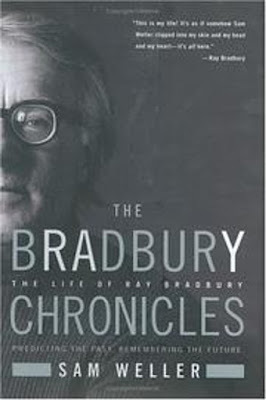 Sam Weller: The Bradbury Chronicles (2005)
Sam Weller: The Bradbury Chronicles (2005)
Published on June 04, 2023 14:48
May 24, 2023
The Life of the Mind
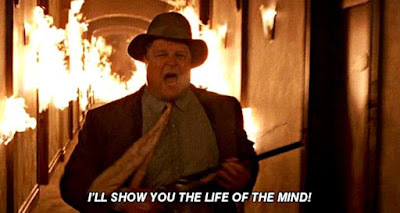 The Coen Brothers: Barton Fink (1991)
The Coen Brothers: Barton Fink (1991)All Balled Up at Head Office
Certainly the , Joel and Ethan, do not present a particularly attractive picture of the writing life in their satirical masterpiece . "You never listen!" John Goodman (aka Karl "Mad Dog" Mundt) thunders at the hapless Barton as he charges down the burning corridor.
I published a post called "Two Views of the Writer" some years ago, but now I'd like to update the examples I gave there with my own favourite description of what Barton Fink refers to as "the life of the mind". It comes from H. G. Wells' 1896 short story "The Lost Inheritance":
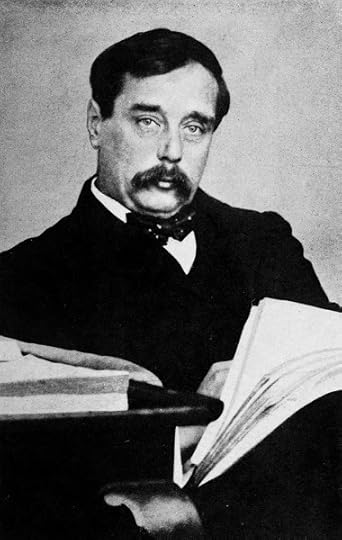 The Daily Mirror: H. G. Wells (1866-1946)
The Daily Mirror: H. G. Wells (1866-1946)“My uncle — my maternal uncle ... had — what shall I call it — ? A weakness for writing edifying literature. Weakness is hardly the word — downright mania is nearer the mark. He’d been librarian in a Polytechnic, and as soon as the money came to him he began to indulge his ambition. It’s a simply extraordinary and incomprehensible thing to me. Here was a man of thirty-seven suddenly dropped into a perfect pile of gold, and he didn’t go — not a day’s bust on it. One would think a chap would go and get himself dressed a bit decent — say a couple of dozen pair of trousers at a West End tailor’s; but he never did. You’d hardly believe it, but when he died he hadn’t even a gold watch. It seems wrong for people like that to have money. All he did was just to take a house, and order in pretty nearly five tons of books and ink and paper, and set to writing edifying literature as hard as ever he could write. ...
“He was a curious little chap, was my uncle, as I remember him. ... Hair just like these Japanese dolls they sell, black and straight and stiff all round the brim and none in the middle, and below, a whitish kind of face and rather large dark grey eyes moving about behind his spectacles. ... He looked a rummy little beggar, I can tell you. Indoors it was, as a rule, a dirty red flannel dressing-gown and a black skull-cap he had. That black skull-cap made him look like the portraits of all kinds of celebrated people. He was always moving about from house to house, was my uncle, with his chair which had belonged to Savage Landor, and his two writing-tables, one of Carlyle’s and the other of Shelley’s, so the dealer told him, and the completest portable reference library in England, he said he had — and he lugged the whole caravan, now to a house at Down, near Darwin’s old place, then to Reigate, near Meredith, then off to Haslemere, then back to Chelsea for a bit, and then up to Hampstead. He knew there was something wrong with his stuff, but he never knew there was anything wrong with his brains. It was always the air, or the water, or the altitude, or some tommy-rot like that. ‘So much depends on environment,’ he used to say, and stare at you hard, as if he half suspected you were hiding a grin at him somewhere under your face. ‘So much depends on environment to a sensitive mind like mine.’”
“What was his name? You wouldn’t know it if I told you. He wrote nothing that anyone has ever read — nothing. No one could read it. He wanted to be a great teacher, he said, and he didn’t know what he wanted to teach any more than a child. So he just blethered at large about Truth and Righteousness, and the Spirit of History, and all that. Book after book he wrote and published at his own expense. He wasn’t quite right in his head, you know really; and to hear him go on at the critics — not because they slated him, mind you — he liked that — but because they didn’t take any notice of him at all. ‘What do the nations want?’ he would ask, holding out his brown old claw. ‘Why, teaching — guidance! They are scattered upon the hills like sheep without a shepherd. There is War and Rumours of War, the unlaid Spirit of Discord abroad in the land, Nihilism, Vivisection, Vaccination, Drunkenness, Penury, Want, Socialistic Error, Selfish Capital! Do you see the clouds, Ted —?’ My name, you know — ‘Do you see the clouds lowering over the land? and behind it all — the Mongol waits!’ He was always very great on Mongols, and the Spectre of Socialism, and suchlike things.”
“Then out would come his finger at me, and with his eyes all afire and his skull-cap askew, he would whisper: ‘And here am I. What did I want? Nations to teach. Nations! I say it with all modesty, Ted, I could. I would guide them; nay! But I will guide them to a safe haven, to the land of Righteousness, flowing with milk and honey.’”
“That’s how he used to go on. Ramble, rave about the nations, and righteousness, and that kind of thing. Kind of mincemeat of Bible and blethers. From fourteen up to three-and-twenty, when I might have been improving my mind, my mother used to wash me and brush my hair (at least in the earlier years of it), with a nice parting down the middle, and take me, once or twice a week, to hear this old lunatic jabber about things he had read of in the morning papers, trying to do it as much like Carlyle as he could, and I used to sit according to instructions, and look intelligent and nice, and pretend to be taking it all in. ...
“’A moment!’ he would say. ‘A moment!’ over his shoulder. ‘The mot juste, you know, Ted, le mot juste. Righteous thought righteously expressed — Aah —! Concatenation. And now, Ted,’ he’d say, spinning round in his study chair, ‘how’s Young England?’ That was his silly name for me.”
“Well, that was my uncle, and that was how he talked — to me, at any rate. With others about he seemed a bit shy. And he not only talked to me, but he gave me his books, books of six hundred pages or so, with cock-eyed headings, ‘The Shrieking Sisterhood,’ ‘The Behemoth of Bigotry,’ ‘Crucibles and Cullenders,’ and so on. All very strong, and none of them original. The very last time, but one, that I saw him, he gave me a book. He was feeling ill even then, and his hand shook and he was despondent. I noticed it because I was naturally on the look-out for those little symptoms. ‘My last book, Ted,’ he said. ‘My last book, my boy; my last word to the deaf and hardened nations;’ and I’m hanged if a tear didn’t go rolling down his yellow old cheek. He was regular crying because it was so nearly over, and he hadn’t only written about fifty-three books of rubbish. ‘I’ve sometimes thought, Ted —’ he said, and stopped.”
“’Perhaps I’ve been a bit hasty and angry with this stiff-necked generation. A little more sweetness, perhaps, and a little less blinding light. I’ve sometimes thought — I might have swayed them. But I’ve done my best, Ted.’”
“And then, with a burst, for the first and last time in his life he owned himself a failure. It showed he was really ill. He seemed to think for a minute, and then he spoke quietly and low, as sane and sober as I am now. ‘I’ve been a fool, Ted,’ he said. ‘I’ve been flapping nonsense all my life. Only He who readeth the heart knows whether this is anything more than vanity. Ted, I don’t. But He knows, He knows, and if I have done foolishly and vainly, in my heart — in my heart —’”
“Just like that he spoke, repeating himself, and he stopped quite short and handed the book to me, trembling. Then the old shine came back into his eye. I remember it all fairly well, because I repeated it and acted it to my old mother when I got home, to cheer her up a bit. ‘Take this book and read it,’ he said. ‘It’s my last word, my very last word. I’ve left all my property to you, Ted, and may you use it better than I have done.’ And then he fell a-coughing.”
“I remember that quite well even now, and how I went home cock-a-hoop, and how he was in bed the next time I called. ... He was sinking fast. But even then his vanity clung to him.
“’Have you read it?’ he whispered.”
“’Sat up all night reading it,’ I said in his ear to cheer him. ‘It’s the last,’ said I, and then, with a memory of some poetry or other in my head, ‘but it’s the bravest and best.’”
“He smiled a little and tried to squeeze my hand as a woman might do, and left off squeezing in the middle, and lay still. ‘The bravest and the best,’ said I again, seeing it pleased him. But he didn’t answer. ... I looked at his face, and his eyes were closed, and it was just as if somebody had punched in his nose on either side. But he was still smiling. It’s queer to think of — he lay dead, lay dead there, an utter failure, with the smile of success on his face.
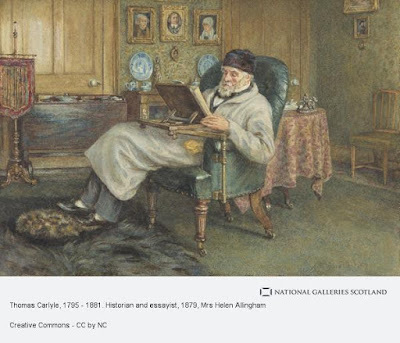 Helen Allingham: Thomas Carlyle (1795-1881)
Helen Allingham: Thomas Carlyle (1795-1881)The will, alas, is nowhere to be found, so the whole estate goes to another, far less attentive nephew instead. The narrator falls "on hard times, because as you see, the only trade I knew was legacy-cadging."
"I was hunting round my room to find something to raise a bit on for immediate necessities, and the sight of all those presentation volumes — no one will buy them, not to wrap butter in, even — well, they annoyed me. I promised him not to part with them, and I never kept a promise easier. I let out at them with my boot, and sent them shooting across the room. One lifted at the kick, and spun through the air. And out of it flapped — You guess?
“It was the will. He’d given it to me himself in that very last volume of all.”
... “It just shows you the vanity of authors,” he said, looking up at me. “It wasn’t no trick of his. He’d meant perfectly fair. He’d really thought I was really going home to read that blessed book of his through. But it shows you, don’t it —?” his eye went down to the tankard again —, “It shows you too, how we poor human beings fail to understand one another.”
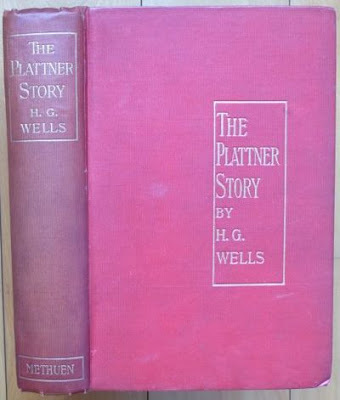 H. G. Wells: The Plattner Story and Others (1897)
H. G. Wells: The Plattner Story and Others (1897)It's a cruel story, in many ways. The absurdity of the uncle's ambitions, all his attempts to sound like Carlyle or some other great sage, are skewered with immaculate precision by the ruthless young Wells, whose books, in 1896, were already starting to sell - in increasingly large numbers.
But the last laugh is, of course, on the nephew, whose cadging flattery inspires the old man to slip him what he wants most, the will, in this furtive way. And yet, one can hear a certain reluctant affection breaking through all the cynical chatter - despite himself, it's hard to believe that he didn't feel something for his uncle. After all, he didn't have to go quite to those lengths to placate him: "It’s the last, but it’s the bravest and best."
I've wondered sometime if this early story came into Wells's mind at all as he was composing his own last book - not so much of Bible, but of Science and blethers - Mind at the End of Its Tether, in 1945. He'd long since lost his audience, and was largely talking to himself by this stage. But there's a horrible woolly vagueness about his work at the end which is sadly reminiscent of the author of The Shrieking Sisterhood, The Behemoth of Bigotry, or Crucibles and Cullenders ... Beware of what you mock, because that may turn out to be you in the end.
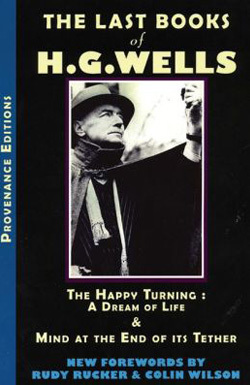 H. G. Wells: The Last Books of H.G. Wells: The Happy Turning & Mind at the End of its Tether (1945 / 2006)
H. G. Wells: The Last Books of H.G. Wells: The Happy Turning & Mind at the End of its Tether (1945 / 2006)I was reminded irresistibly of this story when I came across an article on "The dream job most New Zealanders long for, and how to get it", by Annemarie Quill, on the Stuff website in January this year:
One career tops the list in Aotearoa as the most desirable job in the country, according to new Google search data, yet it is not always the easiest or best paying.But what kind of a writer?
The dream job that most New Zealanders long to do for a living has been revealed by global analysis of 12-months of Google search data around job types, including the question “How to be a...”
The answer for Kiwis was, apparently ... a writer.
 NZ Herald: Keri Hulme & Eleanor Catton (28/1/15)
NZ Herald: Keri Hulme & Eleanor Catton (28/1/15)Kiwis aspiring to win the Booker prize like Eleanor Catton or Keri Hulme, or think they can soar to the top of bestseller lists by knocking out the next Harry Potter or Fifty Shades, could find that the reality of being a writer might not live up to the dream.Bay of Plenty book editor Chad Dick agrees that "It’s a career that people should follow for love, not money ... If the thought of having your book in your hand is enough, then you are half way there.”
“There are big rewards if you reach the very top and yet, it also promises to be a gruelling career for many filled with rejection, self-doubt and financial concerns,” said a spokesperson for Remitly, the financial services group which collated the data.
New Zealand sports journalist turned novelist Peter White said he wasn’t too surprised that so many New Zealanders dreamed of writing.It's not that there isn't a lot of very sensible advice in this article: there is. Those of us in the trade of teaching Creative Writing certainly have to get used to introducing - as diplomatically as possible - a touch of realism into the unrealistically lofty hopes and dreams of aspiring novelists and poets.
“I would have thought it would be All Black, but it makes sense. Everyone has a story inside them, and writing is the perfect way to express it.”
But the question still needs a good deal of unpacking. Is it the idea of being a writer that attracts people, or the actual brute work of writing? The rewards, when they come, are seldom commensurate to the superhuman effort of creating something genuinely worth reading - and the prodigies who seemingly effortlessly spin stories out of thin air are rarer than one might think.
In the end "the thought of having his book in his hand" was apparently not enough for Wells's uncle - even that tottering stack of 53-odd self-published tomes - as he despaired on his deathbed. What he craved was some whisper of recognition. Did he believe those last lying words of his nephew? Perhaps - perhaps not.
But he was still smiling. It’s queer to think of — he lay dead, lay dead there, an utter failure, with the smile of success on his face.
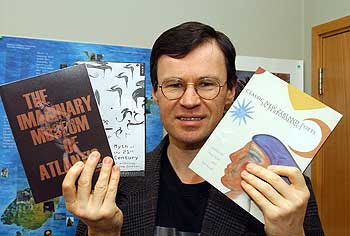 Jack Ross: Biblioblitz (2006)
Jack Ross: Biblioblitz (2006)Perhaps that's the final irony of Wells's story. It's presumably meant to be a satire on the vanity of authors, but no writer can read it without feeling a reluctant affinity with that poor absurd old man with his vanload of paper and Walter Savage Landor's chair.
"Fake it till you make it." I remember hearing Martha Stewart angrily denouncing this doctrine on her own abortive version of The Apprentice Reality TV show: "I never faked anything. I went to jail, for God's sake!"
I'm not quite sure how being convicted of insider trading equates with not being a fake, but then "that's just facts", as another popular adage has it. All writers are fakes. Even the ones who win huge prizes and the adulation of millions have, somewhere inside them, some last remaining vestiges of impostor syndrome.
Which is not to say that there's no difference between H. G. Wells, or Thomas Carlyle, and the poor deluded uncle in the story - but it's more one of degree and scale than of species. If I had to pick a patron saint of writers, it would definitely be the uncle.
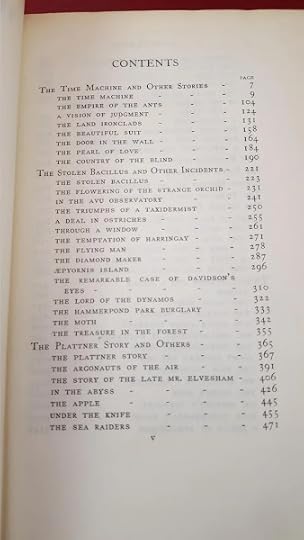 H. G. Wells: The Short Stories (1927)
H. G. Wells: The Short Stories (1927)
Published on May 24, 2023 13:38
May 13, 2023
Amis & Son
 Neil Powell: (2008)
Neil Powell: (2008)Amis fils & Amis père
The other day I was in a bookshop where they were having a "five for five dollars" sale. Even at that price, I found few items to tempt me. An old copy of Spycatcher - yes, I missed reading that at the time, back in the paranoid '80s, but my friend John Fenton assures me it's a valuable piece of social history - that went in the bag. What else? An anthology of writings about the Battle of Britain, edited by some flying ace or other; a companion volume about pioneer aviators; Andrew Motion's Selected Poems; and - Amis & Son: Two Literary Generations ...
You'd think the latter would have been a shoo-in, given my longstanding obsession with the life and works of Kingsley Amis and (to a somewhat lesser extent) his son and literary rival Martin. Not so. I already own no fewer than three full-length biographies of "Kingers", as his friends used to call him, and - to be honest - I felt a bit reluctant to add to their number.
Still: five for five dollars - not to mention the fact that there isn't, so far as I'm aware, much biographical writing as yet about Martin - or 'Amis fils', as he's sometimes called. So I duly bought it and stowed it away on the shelf devoted to just such Amisiana. Until, the other day, feeling in dire need of a bit of a laugh - and I do find both Amises irresistibly amusing at times - I picked it up and started to read it.
 London Remembers: Sir Kingsley Amis
London Remembers: Sir Kingsley AmisIt begins, sensibly enough, with a visit to "Kingsley Amis's earliest childhood home - 16 Buckingham Gardens, Norbury, SW16." The author is quick to refute "the green plaque stating that Sir Kingsley Amis was born here" placed there by the local council. Apparently he wasn't. As for the house itself, and its immediate ambience:
Even if Buckingham Gardens hasn't gone down in the world much since the Amises lived here, it hasn't come up; only one of the houses shows the slightest hint of ownerly gentrification, and it looks out of place.So far so good. Class insecurity is a major theme of Neil Powell's book as a whole, so this seems a good place to start. But then:
The air carries a stong and unmistakable whiff of curry, which Kingsley mightn't in one sense have minded (it was among the few foods he actually enjoyed), though in another he'd have minded quite a bit: he was no racist, but he strongly disliked the quality of English life being mucked about. [p.1]I had to read this sentence a couple of times before its implications really began to sink in. I mean, I have lived in the UK. I do know the terrain - to some extent, at least. What Powell appeared to me to be saying was that the area has been taken over by foreigners - the kind who eat a good deal of curry. Not only that, there is - is there not? - an implication that their very presence here constitutes some kind of affront to the "quality of English life."
 Carcanet Press: Neil Powell
Carcanet Press: Neil PowellPerhaps I'm overreading it, I thought, resisting my first impulse to throw the book across the room. Surely he can't mean that. In any case, I decided to give him the benefit of the doubt and persevere.
Certainly Neil Powell knows a good story when he hears one. I'm not sure that I came across many in his pages which I hadn't already encountered in Amis's Memoirs or one of the other biographies, but they were certainly just as amusing when retold here. He also quotes lengthy passages from Amis's Letters, which reminded me of just how rib-ticklingly funny that book can be - one of the few such volumes that it actually is dangerous to be caught reading in a public place. People are liable to think that you're throwing a fit.
But is this enough? Is this really a necessary book? As D. J. Taylor puts it in his own notice of Amis and Son in the Literary Review :
On the shelf beside me as I write this are, in chronological order, Kingsley’s Memoirs (1991), Eric Jacobs’s Kingsley Amis: A Biography (1995), Martin’s Experience (2000), Zachary Leader’s edition of The Letters of Kingsley Amis (2000), Richard Bradford’s Lucky Him (2001), advertised as a ‘biography’ but in fact an exceptionally astute critical survey, and Leader’s jumbo-sized The Life of Kingsley Amis (2006). They are all interesting books, up to a point, but there are an awful lot of them and the message emerging from their three or four thousand collective pages is generally the same.I too own all of these books, and am forced - somewhat reluctantly - to concur with Taylor's opinion that "one can think of novelists twice as good who have attracted half the volume of scholarly, or not so scholarly, exegesis."
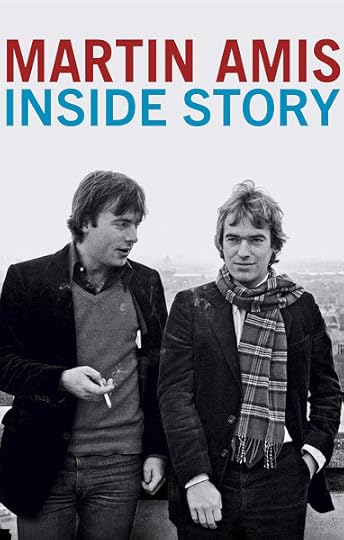 Martin Amis: Inside Story (2020)
Martin Amis: Inside Story (2020)Where there's already so much competition, justifying the appearance of yet another tome on much the same subject surely requires a bit of special pleading. So, unless Powell has an exceptionally compelling new reading of Amis père to offer (and I'm not sure that he does), his book really stands or falls on the value of any new material he can provide on Amis fils.
It's true that Powell evinces a number of opinions which are (to put it mildly) not in line with my own. He seems to take it for granted that any time spent reading Science Fiction is time wasted, and that Kingsley Amis's pioneering efforts as a critic and anthologist of the field ought therefore to be written off as simple self-indulgence. Powell even claims that Kingsley (he refers to him by his first name throughout, so I don't see why I shouldn't) would have been much better off expanding his (failed) BLitt thesis on the popular audience for Victorian poetry into a monograph than dignifying such disposable 'genre fiction' with his attention. And yet, to me, that's one of the strongest arguments in favour of Kingsley's critical acumen.
But just because I happen to disagree with many of Powell's views is no reason to dismiss them out of hand. At this point I thought it might be a good idea to see what some other readers thought of his book. There are a couple of puffs on the cover: "A delight: witty, clever and astute" - Observer, plus a blurb description of it as a "witty, opinionated and thoroughly readable critical biography"; D. J. Taylor, too, refers to it "a thoughtfully written study," in the passage from his review quoted above.
 The Wheeler Centre: Peter Craven
The Wheeler Centre: Peter CravenThere was at least one writer who felt much as I did about it, however. You can, if you wish, read it for yourself on the website of the Melbourne Age for July 22, 2008, but here are a couple of quotes from Australian critic Peter Craven's review:
That's going straight for the jugular! But why exactly does he think so?
Amis and Son, Neil Powell's would-be critical biography of Kingsley Amis, author of Lucky Jim and Take a Girl Like You, and Martin Amis, his son, author of The Rachel Papers and London Fields, is ... a silly and sickening book that is liable to be taken more seriously than it deserves.
It is essentially a critical book, buttressed by biographical summary that tends to be used as an increasingly impertinent crutch for the evaluative judgements that keep jumping about between the lives and the works of Amis father and son.Certainly this is a problem if, as I've argued above, the book's raison d'être really has to be providing a substantive reading of Martin's work, rather than rehashing the far more readily available material on Kingsley. But Powell, according to Peter Craven, is:
It is less obviously debilitating in the case of Kingsley because the burden of Powell's book is that Smarty isn't half the writer that his Dad was. Smarty Anus, you'll recall, is Private Eye's empathic nickname for Martin Amis, a homage of an epithet if ever there was one.
the kind of narrow and overweeningly snooty critic who is constantly confusing the limitations of human beings with the faults of their work. It is not a vice confined to the British, but one they exhibit with a peculiar intensity and obnoxiousness.
At its worst this kind of writing is constantly sliding into what sounds like social condescension. It is especially dominant where criticism and biography meet, as in the truly appalling studies of Anthony Burgess and Laurence Olivier by Roger Lewis.
 Roger Lewis
Roger LewisI, too, have read Roger Lewis's rambling and incoherent 'critical biography' of Anthony Burgess, so I do see the point Craven is making here. I haven't read Lewis on the subject of Olivier, but I do have a copy of his apparently equally venomous Life and Death of Peter Sellers lying around somewhere. Is Powell really as bad as that?
Certainly he says some odd things at times. While describing a seduction scene in Martin's The Rachel Papers (1973), which takes place to the accompaniment of the Beatles' Sergeant Pepper's Lonely Hearts Club Band, regarded by the hero as "a safe choice, since to be against the Beatles (late-middle period) is to be against life", Powell calls 'When I'm Sixty-Four' and 'Lovely Rita':
the two songs which despite their jaunty surfaces most clearly reveal the Beatles' underlying callousness and contempt for other people. [pp.297-98]Really? Do they? Maybe I've been getting them wrong all these years. It does seem a rather extreme view, though it certainly matches up with an earlier diatribe by Powell about "a truly shocking moment in Experience", where Martin mentions:
Bach's 'Concerto for Cello', in four words conveying ignorance of musical history, the composer's oeuvre and the difference between a concerto and a sonata ... His father had been able to take a scurrilously disrespectful view of received culture precisely because he knew a good bit about it from quite early on. Martin didn't have that luxury; hence, despite his plumage, he had to become a successfully diligent gnome. [pp.288-89]Yes, Martin (or his editor) should have picked up on that mistake. But then, Powell's own book is not exactly error-free. In any case, isn't all this a bit of an overreaction? Does it really justify describing him a "successfully diligent gnome"? Perhaps it's an English thing. As my Birmingham-born friend Martin Frost once remarked to me, "It's not that you're outside the class system, Jack, it's that you're beneath it."
The nuances of class are clearly something that fascinates Powell, though one can't help feeling that he's not talking solely about the two Amises when he mounts his own "unfashionable defence" of these curious caste divides:
at least since the mid-eighteenth century, class in England has been extraordinarily fluid, enabling immense social leaps to be made within individual lifetimes ... [and] this fluidity coincides with the rise of the English novel, which has made class - in its nuances, misunderstandings and unexpected transitions - one of its major themes. [p.315]"For the novelist it remains an indispensable resource". Powell's defence of class seems to boil down to two not easily reconcilable statements: 1/ that it doesn't really work; 2/ that it's great to write about. Sometimes it's nice to be a New Zealander and not feel that you have to worry about that kind of thing.
I'm not myself a great fan of Martin Amis, whose works I stopped collecting some years back, but I have read a number of them, including Money and London Fields, and would certainly agree with Peter Craven's praise of his attempts to reclaim:
the vast underworld of London street talk and the way contemporary Britain actually talked in his mature fiction. Powell's culpable stupidity about this goes most of the way towards disqualifying him from saying anything of critical interest about Martin.In short, then:
Craven concedes that "it's easy enough to be irritated by Martin Amis."
Amis and Son is a book by a critic of some intelligence who nonetheless constantly dissipates his insights because his swaggering irritation at one of his two subjects makes him blindingly daft.
You can even go halfway with Tibor Fischer's assessment, quoted by Powell, of Martin Amis as "an atrocity-chaser ... constantly on the prowl for gravitas enlargement offers (the Holocaust, serial killers, 9/11, the Gulag, the Beslan siege) as if writing about really bad things will make him a really great novelist", and still acknowledge that, on a good day, he is one of the most significant writers in Britain to have produced fiction in the past 30 years.
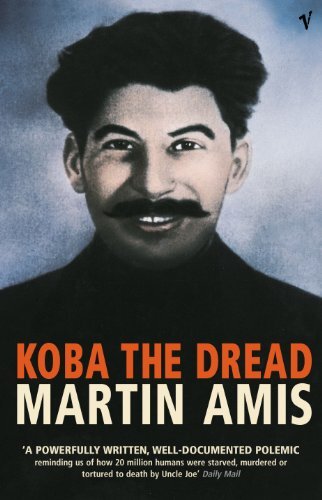 Martin Amis: Koba the Dread (2002)
Martin Amis: Koba the Dread (2002)That seems like a pretty judicious distinction to me. One of the books I have read by Martin Amis is his account of Stalin, Koba the Dread. It inspired me to verse, in fact:
There was definitely a smug, de haut en bas tone about Amis's book which I found irksome. But then, I almost died laughing at the antics of the two warring novelists in his 1995 novel The Information - you'll have noticed the clever way I've inserted a reference to it in the clerihew above - not to mention the appalling works they're respectively responsible for:
Koba the Dread: Laughter and the Twenty Million
Stalin’s a bad man I know
Martin Amis told me so
It's not exactly a revelation
but thank you for the Information
[26/9/2002]
What's your novel called?That's the book by thwarted novelist Richard Tull which causes anyone who tries to read it to start bleeding from the eyes, a condition rapidly escalating into a brain hemorrhage if they're foolish enough to persist. His rival Gwyn Barry's successful Utopia Amelior sounds equally emetic, though fortunately far less lethal.
Untitled
Don't you have a title for it yet?
No, it's called "Untitled" ...
I'm still not sure what The Information is actually about, but it's hard to care when the incidental details are as good as that. Martin Amis is certainly not a jolly or a likeable writer, but the sheer power and variety of his prose makes up for an awful lot.
One of the oddest passages in Powell's book is the one where he unpacks "one of the riddling paradoxes of fiction":
an unambitious form is one crucial respect more ambitious than an ambitious one: it is, in this sense, easier to write Ulysses than a novel by, say, Barbara Pym or C. P. Snow. Ulysses competes only with itself, with its own ambition; a novel by Pym or Snow competes with thousand others about middle-class women, strange clergymen and mendacious academics. [pp.311-12]Carried to an extreme, wouldn't this doctrine militate against Powell's earlier dismissal of Ian Fleming, one of Kingsley's favourite writers, as "a bad and pernicious author" [p.148]? I mean, isn't it harder to compete with a thousand other thrillers replete with "pornographic sadism" than to write, say, Tom Jones or Tristram Shandy? Fielding and Sterne were only competing with themselves, after all, whereas Fleming has Raymond Chandler, Dashiell Hammett and Micky Spillane all barking at his heels ...
As one progresses through his book and encounters more and more opinions of this nature, it becomes increasingly difficult to take Powell seriously as a critic. There's an ad hominem tone to his judgements which seems driven by personal animus rather than disinterested analysis. Peter Craven, too, has difficulties with this aspect of his writing:
You're free to think that none of Martin Amis has as sure a place in the canon as Lucky Jim, but that's not the point. Powell is an interesting guide to the ins and outs of Kingsley's fiction, and some of his tips about particular books may be worth following. On the other hand he is an admirer of Martin's Time's Arrow - the Holocaust novel that runs backward - so you have to wonder.Yes, I'm with him there. For me, Time's Arrow is a one-page idea dragged out to the length of an entire novel. On the other hand, I was intrigued to see that (unlike Richard Bradford in Lucky Him), Powell likes Kingsley's late novel The Folks Who Live on the Hill as much as I do. And, while I remain unconvinced by his defence of the quasi-psychotic excesses of Stanley and the Women, it's interesting to hear his views on the matter.
Craven concludes his review as follows:
The word about this book is that it's the bollocking Martin Amis always had coming to him. It isn't, it's a spiteful and thoughtless book by a vain and shallow critic who is defeated by everything in his hugely talented contemporary that shows up his own narrowness and pettiness and lack of feeling for the rough and ready words and grand ambitions that might encompass a world or transform it in fiction."What defeats him is human beings and the way the details of a life might illuminate a writer's work." Strong words here from Craven; it's hard to dissent, though, if you've actually made your way through Powell's book. It's a pity, in particular, that he makes such great play with the (alleged) carelessness and ignorance of the two Amises when you consider his own vulnerability on this score.
To take one example. He concludes, on p.371, a long denunciation of Martin's use of Americanisms in his prose by saying that a writer's job is "To purify the dialect of the tribe" - a dictum he attributes to T. S. Eliot. While it's true that this phrase does indeed appear in Part II of "Little Gidding" (1942), the last of Eliot's Four Quartets, it is actually (of course), an Englishing of Mallarmé's famous line "Donner un sens plus pur aux mots de la tribu" from the sonnet "Le tombeau d'Edgar Poe".
There's a double irony in this. Powell's view of Amis's prose style as "veering away as far as possible from an English conversational voice towards a demotic statelessness" would surely apply far better to the work of the deracinated American T. S. Eliot than to unrepentant Londoner Martin Amis? And, given that Mallarmé attributed this purification of the "tribal" dialect to another American, Edgar Allan Poe, its use as a guarantor of "Englishness" here seems particularly eccentric.
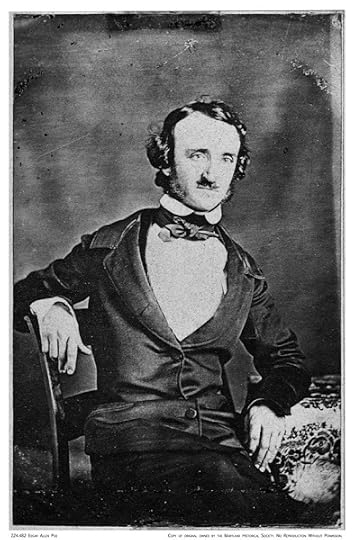 Edgar Allan Poe (1970s)
Edgar Allan Poe (1970s)But if Powell's book is so bad, why waste so much time and energy on it? It's a fair question. I suppose that the answer might be because I wanted it to be better than it is. For my all my reading and rereading of their works, I still find even the elder Amis - let alone the younger - something of a mystery.
Since I know so much less about Martin than Kingsley, it was really this aspect of Powell's book that I hoped to learn most from. I've read almost all of the novels he analyses - the early to mid-career ones - and was surprised to find how little validity I found in his assessments of them. The two most - to me - doctrinaire and mechanical, Success and Time's Arrow, he rates most highly, whereas the verbal pyrotechnics of Money, London Fields, and The Information seem to leave him cold.
Mind you, there's no accounting for tastes, and there's no moral obligation on him to like these books. I'm not sure that I exactly like them myself. But I do agree with Peter Craven about the immense gravitas of the task Martin Amis set himself in attempting to reclaim "the vast underworld of London street talk and the way contemporary Britain actually talked in his mature fiction."
Like Dickens, Martin Amis has trouble with plots: there's always either too much or too little of it in all of his novels. But that's not really why I read them. Not purely for pleasure, but for "news that stays news" (to employ another Americanism) - in this case, news about the language.
In any case, Powell's book is clearly not the one I need. Maybe, in fact, I don't need any more critical books or biographical accounts of either author, but simply to reimmerse myself in their works. If so, I should probably tender some thanks to Neil Powell for reminding me of that.
 Kingsley & Martin (1970s)
Kingsley & Martin (1970s)•
 Kingsley Amis (1989)
Kingsley Amis (1989)Sir Kingsley William Amis
(1922-1995)
Poetry:
Bright November (1947)[Bright November: Poems. London: the Fortune Press, n.d. (1947?)] A Frame of Mind (1953) Poems. Fantasy Portraits (1954)A Case of Samples: Poems 1946–1956 (1956)The Evans County (1962)A Look Round the Estate: Poems, 1957–1967 (1968)Collected Poems 1944–78 (1979)Collected Poems 1944-1979. London: Hutchinson & Co. (Publishers) Ltd., 1979.
Novels:
The Legacy (1948) [unpublished]Lucky Jim (1954)Lucky Jim: A Novel. 1953. London: Victor Gollancz, Ltd., 1954. That Uncertain Feeling (1955)That Uncertain Feeling. 1955. Four Square Books Ltd. London: New English Library Ltd. / Sydney. Horwitz Publications Inc. Pty. Ltd., 1962. I Like It Here (1958)I Like it Here. 1958. Penguin Book 2884. Harmondsworth: Penguin, 1968. Take a Girl Like You (1960)Take A Girl Like You. 1960. Harmondsworth: Penguin, 1976. One Fat Englishman (1963)One Fat Englishman. 1963. Penguin Book 2417. Harmondsworth: Penguin, 1966. [with Robert Conquest] The Egyptologists (1965)[with Robert Conquest. The Egyptologists. 1965. Panther Books Ltd. Frogmore, St Albans, Herts: Granada Publishing Limited, 1975. The Anti-Death League (1966)The Anti-Death League. 1966. Penguin Book 2803. Harmondsworth: Penguin, 1968. [as Robert Markham] Colonel Sun: A James Bond Adventure (1968)[as ‘Robert Markham’]. Colonel Sun: A James Bond Adventure. 1968. London: Pan Books Ltd., n.d. I Want It Now (1968)I Want It Now. 1968. London: Panther Books, 1969. The Green Man (1969)The Green Man. London: Jonathan Cape Ltd., 1969. Girl, 20 (1971)Girl, 20. 1971. London: The Book Club, by arrangement with Jonathan Cape Ltd., 1972. The Riverside Villas Murder (1973)The Riverside Villas Murder. 1973. London: Book Club Associates / Jonathan Cape Ltd., 1974. Ending Up (1974)Ending Up. London: Jonathan Cape Ltd., 1974. The Crime of the Century (1975)The Crime Of The Century. 1975. Introduction by the Author. Everyman Paperbacks: Mastercrime. London: J. M. Dent & Sons Ltd., 1987. The Alteration (1976)The Alteration. 1976. Triad / Panther Books. Frogmore, St Albans, Herts: Triad Paperbacks Ltd, 1978. Jake's Thing (1978)Jake's Thing. 1978. Harmondsworth: Penguin, 1979. Russian Hide-and-Seek (1980)Russian Hide-and-Seek: A Melodrama. 1980. Harmondsworth: Penguin, 1981. Stanley and the Women (1984)Stanley and the Women. London: Hutchinson & Co. (Publishers) Ltd., 1984. The Old Devils (1986)The Old Devils. 1986. Hutchinson. London: Century Hutchinson Ltd., 1986. Difficulties with Girls (1988)Difficulties With Girls. 1988. Harmondsworth: Penguin, 1989. The Folks That Live on the Hill (1990)The Folks That Live on the Hill. Hutchinson. London: Century Hutchinson Ltd, 1990. We Are All Guilty (1991)We Are All Guilty. London: Reinhardt Books / Viking, 1991. The Russian Girl (1992)The Russian Girl. 1992. Harmondsworth: Penguin, 1993. You Can't Do Both (1994)You Can't Do Both. Hutchinson. London: Random House (UK) Ltd., 1994. The Biographer's Moustache (1995)The Biographer's Moustache. 1995. Flamingo. London: HarperCollins Publishers, 1996. Black and White (c.1995) [unfinished]
Short Stories:
My Enemy's Enemy (1962)My Enemy's Enemy. 1962. Harmondsworth: Penguin, 1965. Collected Short Stories (1980)Collected Short Stories. 1980. Harmondsworth: Penguin, 1983. Mr Barrett's Secret and Other Stories (1991)Mr Barrett's Secret and Other Stories. 1993. Harmondsworth: Penguin, 1994. Complete Stories (1980)Complete Stories. Foreword by Rachel Cusk. Penguin Classics. London: Penguin, 2011.
Non-fiction:
Socialism and the Intellectuals. Fabian Society pamphlet (1957)New Maps of Hell: A Survey of Science Fiction (1960)New Maps of Hell: A Survey of Science Fiction. 1960. A Four Square Book. London: New English Library Limited., 1963. The James Bond Dossier (1965)The James Bond Dossier. 1965. London: Pan Books Ltd., 1966. [as Lt.-Col William ('Bill') Tanner] 1965 The Book of Bond, or Every Man His Own 007 (1965)What Became of Jane Austen?, and Other Questions (1970)What Became of Jane Austen?, and Other Questions. 1970. Panther Books Limited. London: Granada Publishing Limited, 1972. On Drink (1972)On Drink. Pictures by Nicolas Bentley. 1972. Panther Books Ltd. Frogmore, St Albans, Herts: Granada Publishing Limited, 1974. Rudyard Kipling and His World (1974)Everyday Drinking (1983)Every Day Drinking. Illustrated by Merrily Harpur. London: Hutchinson & Co. (Publishers) Ltd., 1983. How's Your Glass? (1984)The Amis Collection (1990)The Amis Collection: Selected Non-Fiction, 1954-1990. Introduction by John McDermott. 1990. Harmondsworth: Penguin, 1991. Memoirs (1991)Memoirs. Hutchinson. London: Random Century Group Ltd., 1991. The King's English: A Guide to Modern Usage (1997)The King’s English: A Guide to Modern Usage. London: HarperCollins Publishers, 1997. Everyday Drinking: The Distilled Kingsley Amis. ['On Drink' (1972); 'Everyday Drinking' (1983); 'How's Your Glass?' (1984)]. Introduction by Christopher Hitchens (2008)
Edited:
[with Robert Conquest] Spectrum anthology series. 5 vols (1961-66)Spectrum I: A Science Fiction Anthology. Ed. Kingsley Amis & Robert Conquest. 1961. London: Pan Books Ltd., 1964.Spectrum II: A Second Science Fiction Anthology. Ed. Kingsley Amis & Robert Conquest. 1962. Pan Science Fiction. London: Pan Books Ltd., 1965.Spectrum III: A Third Science Fiction Anthology. Ed. Kingsley Amis & Robert Conquest. London: Victor Gollancz, Ltd., 1963.Spectrum IV: A Fourth Science Fiction Anthology. Ed. Kingsley Amis & Robert Conquest. 1965. Pan Science Fiction. London: Pan Books Ltd., 1967.Spectrum V: A Fifth Science Fiction Anthology. Ed. Kingsley Amis & Robert Conquest. 1966. Pan Science Fiction. London: Pan Books Ltd., 1969. G. K. Chesterton. Selected Stories (1972)The New Oxford Book of Light Verse (1978)The New Oxford Book of Light Verse. Oxford: Oxford University Press, 1978. The Golden Age of Science Fiction (1981)The Golden Age of Science Fiction. London: Hutchinson & Co. (Publishers) Ltd., 1981. The Amis Anthology: A Personal Choice of English Verse (1988)
Letters:
The Letters of Kingsley Amis. Ed. Zachary Leader (2000)Leader, Zachary, ed. The Letters of Kingsley Amis. London: HarperCollins Publishers, 2000.Leader, Zachary, ed. The Letters of Kingsley Amis. 2000. Rev. ed. London: HarperCollins Publishers, 2001.
Secondary:
Jacobs, Eric. Kingsley Amis: A Biography. Hodder & Stoughton. London: Hodder Headline PLC, 1995.Bradford, Richard. Lucky Him: The Life of Kingsley Amis. London: Peter Owen Publishers, 2001.Leader, Zachary. The Life of Kingsley Amis. 2006. Vintage Books. London: The Random House Group Limited, 2007.
•
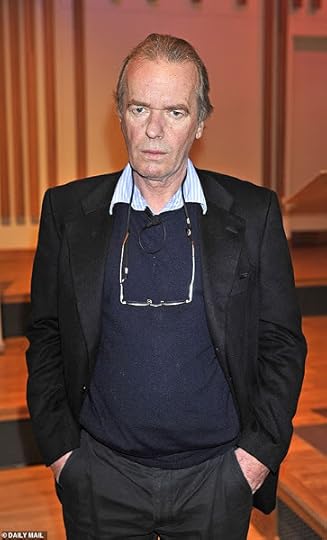
Martin Louis Amis
(1949- )
Novels:
The Rachel Papers (1973)The Rachel Papers. 1973. Frogmore, St Albans, Herts: Granada Publishing Limited, 1976. Dead Babies (1975)Dead Babies. 1975. Harmondsworth: Penguin, 1988. Success (1978)Success. 1978. Harmondsworth: Penguin, 1988. Other People (1981)Other People: A Mystery Story. 1981. Harmondsworth: Penguin, 1988. Money (1984)Money: A Suicide Note. 1984. Harmondsworth: Penguin, 1986. London Fields (1989)London Fields. London: Jonathan Cape Ltd., 1989. Time's Arrow: Or the Nature of the Offence (1991)Time's Arrow, or The Nature of the Offence. 1991. Harmondsworth: Penguin, 1992. The Information (1995)The Information. 1995. Flamingo. London: HarperCollins Publishers, 1995. Night Train (1997)Yellow Dog (2003)House of Meetings (2006)The Pregnant Widow (2010)Lionel Asbo: State of England (2012)The Zone of Interest (2014)The Zone of Interest. Jonathan Cape. London: Random House, 2014. Inside Story (2020)
Short stories:
Einstein's Monsters (1987)Two Stories (1994)God's Dice (1995)Heavy Water and Other Stories (1998)Heavy Water and Other Stories. 1998. Vintage. London: Random House UK Limited, 1999. Amis Omnibus (1999)The Fiction of Martin Amis (2000)Vintage Amis (2004)
Screenplays:
Saturn 3 (1980)London Fields (2018)
Non-fiction:
Invasion of the Space Invaders (1982)The Moronic Inferno: And Other Visits to America (1986)The Moronic Inferno, and Other Visits to America. 1986. King Penguin. Harmondsworth: Penguin, 1987. Visiting Mrs Nabokov: And Other Excursions (1993)Experience (2000)Experience. 2000. Vintage. London: The Random House Group Limited, 2001. The War Against Cliché: Essays and Reviews 1971–2000 (2001)Koba the Dread: Laughter and the Twenty Million (2002)Koba the Dread: Laughter and the Twenty Million. 2002. Vintage. London: The Random House Group Limited, 2003. The Second Plane (2008)The Rub of Time: Bellow, Nabokov, Hitchens, Travolta, Trump. Essays and Reportage, 1986–2016 (2017)
Secondary:
Powell, Neil. Amis & Son: Two Literary Generations. Macmillan. London: Pan Macmillan Ltd., 2008.
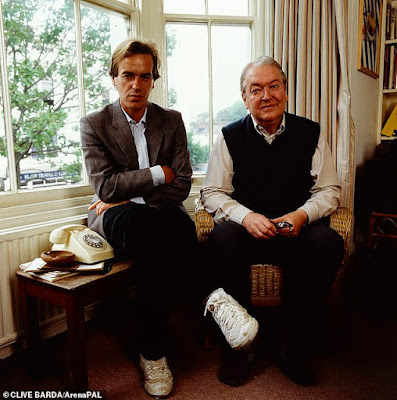 Father and Son? (2020)
Father and Son? (2020)
Published on May 13, 2023 15:55
May 8, 2023
The Wreck of the Batavia
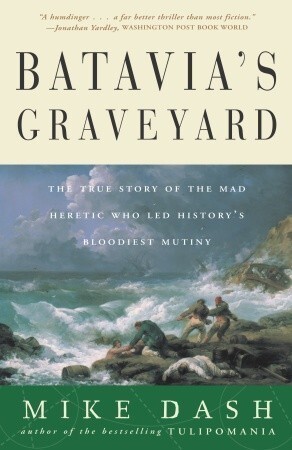 Mike Dash: Batavia's Graveyard (2002)
Mike Dash: Batavia's Graveyard (2002)The other day I picked up a second-hand copy of Mike Dash's Batavia's Graveyard, a sober, no-nonsense account of what his publishers describe as "history's bloodiest mutiny."
The subject is far from novel for me. I remember as a young boy watching a documentary called "The Wreck of the Batavia" which left me with nightmares for weeks afterwards. I don't know if I've ever quite got over it, in fact: especially some of the reenactments where the chief mutineer's henchmen hunted down their victims with knives in the shallow waters of the reef that surrounded them.
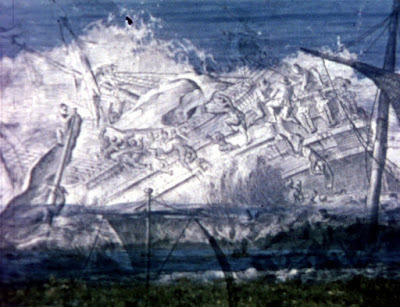 Bruce Beresford, dir.: The Wreck of the Batavia (1973)
Bruce Beresford, dir.: The Wreck of the Batavia (1973)It doesn't surprise me that this film turns out to have been an early work by renowned Australian director Bruce Beresford. There was a horrible authenticity about the live action sequences, in particular, which seems to prefigure the future creator of Breaker Morant , and - in particular - one of my favourite movies of all time, Black Robe .
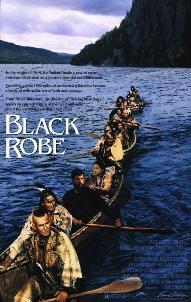 Bruce Beresford, dir.: Black Robe (1991)
Bruce Beresford, dir.: Black Robe (1991)Another important - though unjustly neglected - work inspired by the event is Australian writer Henrietta Drake-Brockman's novel The Wicked and the Fair, which, despite the garish cover-picture below, is quite an interesting and serious work.
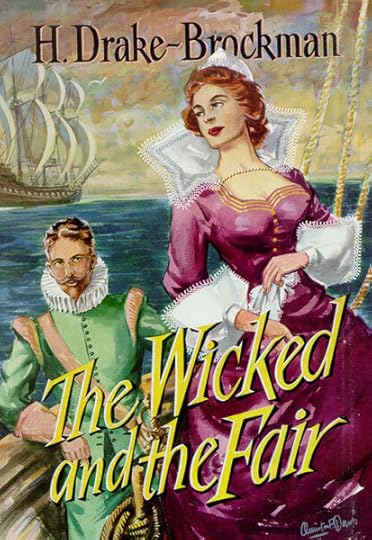 Henrietta Drake-Brockman: The Wicked and the Fair (1957)
Henrietta Drake-Brockman: The Wicked and the Fair (1957)She followed it up with a factual account based on her own extensive local as well as archival research: Voyage to Disaster (1963). Even Mike Dash is forced to admit a considerable debt to this ground-breaking book, though he tempers his admiration for her thoroughness with some rather grudging remarks about her frustrating lack of clear indexing.
 Jeremy Roberts: The Dark Cracks of Kemang: The Bajaj Boys in Indonesia (2022)
Jeremy Roberts: The Dark Cracks of Kemang: The Bajaj Boys in Indonesia (2022)Why did this story leave such an indelible mark on me? Recently I've been reading poet Jeremy Roberts' account of his own time in Indonesia - in Jakarta, in fact, the 'Batavia' of the Dutch colonists.
One can read in every line of his book his simultaneous attraction / repulsion for the chaotic city and its teeming sea of inhabitants. I've never visited Indonesia, so can't really comment, but my own travels in Thailand and India give me some hint of what he's talking about - that incommunicable atmosphere one feels in a large sprawling Eastern urban centre, especially at evening, when the heat of the day recedes and everyone comes out on the street to eat and talk.
Of course, though Batavia was the planned destination for the ship, in fact the Batavia itself never got there. It was wrecked off the coast of Western Australia. It's possible, in fact, that two of the mutineers eventually marooned on the mainland were the first Europeans to set foot on the lucky country. Batavia, capital of the Dutch East Indies, is where the rest of the survivors ended up, though.
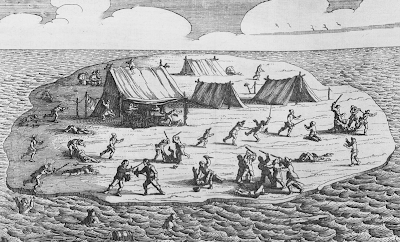 Massacre of the Batavia's survivors (1628)
Massacre of the Batavia's survivors (1628)I suppose that it was the nightmarish revelation of just how far - to what insane and illogical extremes - a truly charismatic leader can go which affected me most about the story. To the very end, even when he stood in front of the gallows, the murderous Jeronimus Cornelisz was still trying to bargain his way out of any responsibilty for what had taken place. The man who had ordered so many deaths for his own amusement could not credit that the same thing might actually happen to him.
In the Bruce Beresford documentary he's described as an Anabaptist - certainly he had idiosyncratic religious views, which included a conviction that any idea that came to him must come from God, and that therefore anything he did, regardless of whether or not it might be considered conventionally "sinful", was ipso facto justified.
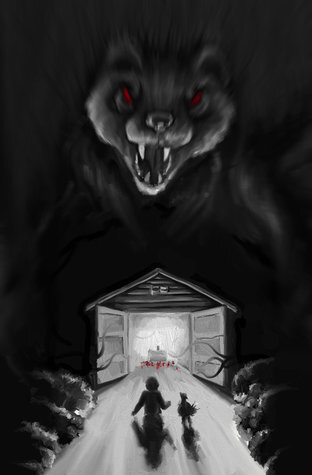 Saki: Sredni Vashtar (1912)
Saki: Sredni Vashtar (1912)The only previous association I had with the word "Anabaptist" came from the Saki story "Sredni Vashtar", where the sickly, neglected boy Conradin has only two friends: "a ragged-plumaged Houdan hen, on which the boy lavished an affection that had scarcely another outlet", and "a large polecat-ferret", which lived in a cage at the back of the tool-shed he spent most of his time in.
And one day, out of Heaven knows what material, he spun the beast a wonderful name, and from that moment it grew into a god and a religion.The Houdan hen, however,
was never drawn into the cult of Sredni Vashtar. Conradin had long ago settled that she was an Anabaptist. He did not pretend to have the remotest knowledge as to what an Anabaptist was, but he privately hoped that it was dashing and not very respectable.Conradin's loathsome guardian Mrs. de Ropp is unimpressed with his choice of a place to play, and announces one morning at breakfast that the hen has been sold and taken away:
With her short-sighted eyes she peered at Conradin, waiting for an outbreak of rage and sorrow ... But Conradin said nothing; there was nothing to be said. Something perhaps in his white set face gave her a momentary qualm, for at tea that afternoon there was toast on the table ...Sredni Vashtar comes through for his worshipper, though. When Mrs. de Ropp goes down to find out just what Conradin has been hiding at the back of the shed ("I believe it's guinea-pigs. I'll have them all cleared away") she gets a little more than she bargained for:
out through that doorway came a long, low, yellow-and-brown beast, with eyes a-blink at the waning daylight, and dark wet stains around the fur of jaws and throat.It's hard not to cheer as the "great polecat-ferret made its way down to a small brook at the foot of the garden, drank for a moment, then crossed a little plank bridge and was lost to sight in the bushes." And yet - much though, like most readers, I relish his triumph - it's disturbing to sense a little of Cornelisz in Coradin, with his great choric hymn:
Sredni Vashtar went forth,
His thoughts were red thoughts and his teeth were white.
His enemies called for peace but he brought them death,
Sredni Vashtar the Beautiful.
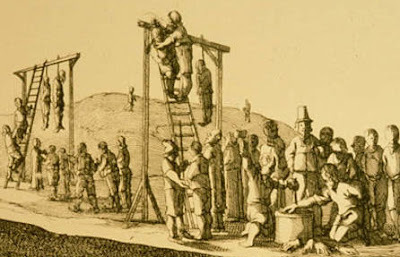 Execution of Cornelisz and the Other Mutineers (1628)
Execution of Cornelisz and the Other Mutineers (1628)
Published on May 08, 2023 18:56
May 1, 2023
The Road Not Taken
Richard von Sturmer: doppelgänger (9/12/2020)
The Interrupted JourneyYesterday I packed up my office at the University of Waikato and am now back in Auckland. When I was passing the photo wall in the foyer of the Arts building, I saw you and wondered, “What is Jack doing here?” Looking closer, your hair was the wrong colour. But in the background there was the message “Ross the face of.” Sort of Yoda-speak. It left me rather confused. And why are you, if it is you, why are you holding up an illustrated map of the Central North Island? I’m still a bit perplexed.- Richard von Sturmer, email to JR (9/12/2020)When Richard sent me the image above with the query: ‘Is this you?’ I too felt quite perplexed. The photo does indeed look quite a lot like me. The words ROSS THE FACE OF are also unequivocal, but the Central North Island is certainly not a region with which I have any particular affinity. My roots lie more in Northland.
Another interesting thing about it is that it shows a middle-aged man with full cheeks, narrow-rimmed glasses and ruffled orange hair. I have the full cheeks and the glasses, but my hair is dark brown going on grey. I did once have it dyed, in a moment of feverish reinvention, during a trek in Thailand. The idea was to go blond, but unfortunately, due to the hairdresser’s unfamiliarity with European hair, it came out orange instead.
So, yes, I did once have hair to match that in the picture, but I was much thinner and younger-looking then – it was more than two decades ago – so while all those attributes have certainly belonged to me at one point or another, I never had them all at the same time: in this part of the multiverse, at any rate.Gabriel White: Jack in Mumbai (15/1/2002)
Another perturbing recent event involved one of those late night searches to confirm your own existence, which in this case took the form of a series of clicks on the ISBN codes for my own books.
Most of them were fine – they duly led to the publication in question – but one of them came up with quite another book. Presumably the National Library had made a mistake, and confused one obscure small publication with another. I had a lot of problems with that book, in fact: it was an anthology of student life writing, and I decided to title it [your name here] in order to gesture (as I thought cleverly), at the essential interchangeability of all such human experiences.
Unfortunately the librarians took that title to be a mere stand-in for the actual title still to come, and refused to list it in their catalogue under that appellation. I had to explain to them again and again just what I had in mind before they would relent. Indexing a title which begins with a square bracket also offers some unique challenges for both human and machine intelligence.
I wonder if John Ashbery had the same problems with his own 1998 book of poems Your Name Here, which appeared a few years after my stroke of bravado? Whether he did or not, any merit there may have been in this jeu d’esprit has now been eclipsed by the so-many-times-brighter magnitude of his star.
•
All of which brings me to the principal pretext for this meditation. The other day I made a surprising find: a large grey volume of variations and additions to Georges Perec’s famed 1979 short story ‘Le Voyage d’hiver’ [The Winter Journey] by members of the European experimental literature club Oulipo [[OUvroir de LIttérature POtentielle] = Workshop of Potential Literature].Georges Perec / Oulipo. Le Voyage d’hiver & ses suites. Postface de Jacques Roubaud. La Librairie du XXIe Siècle. Paris: Éditions du Seuil, 2013.
The reason this seemed so strange is that I’m the only local Perec enthusiast I know of (despite all my best efforts to turn others onto his work), so it’s hard to see how this particular volume ended up, second-hand, in a vintage bookshop in Auckland.
What’s more, this particular story is probably my favourite among all of his fictions. It has a strange atmospheric charm to it which seems – to me at least – almost to outweigh its admittedly intriguing hypothesis.
The conceit of the story is that a single author, Hugo Vernier, wrote an obscure book in the mid-nineteenth century which anticipated not just the ideas but even the verbal substance of most of the greatest works of French poetry from Baudelaire onwards. Unfortunately the one copy of this work seen and scrutinised by the protagonist is torn from him by the fortunes of war. His Winterreise, winter journey, takes place in 1940, just before the fall of France, and he is never able to relocate the book subsequently.
The various members of Oulipo run with this basic idea of anticipation and turn it into an extraordinary farrago of counter-plots involving Hitler, J. Edgar Hoover, and a whole raft of Journeys here, there and everywhere.
A good deal of the merit of Perec’s story comes from its brevity. This book of sequels is over 400 pages long. So where did it come from? How did it end up on the neglected ‘foreign language’ shelf of a city bookshop? Did it belong to some visiting scholar, compelled to abandon their luggage by the demands of the coronavirus? Or a local experimental literature fanatic, who either read and forgot it, or else found the somewhat demanding idiom of some of the stories beyond their linguistic abilities?
Not that I found them particularly easy going either. The only way I got through them, in fact, was to ration myself to just one of the 26 voyages per diem (a device I’ve employed before to get through seemingly impossible reading tasks: the whole of Proust in French, for instance, or the multiple discursive volumes of Casanova’s memoirs).
Most of the stories in the Oulipo book are predictable enough: more-or-less ingenious variations on the forest of themes built up by their predecessors – since the concept of this group of stories as a ‘roman collectif’ appears to have arisen fairly early in the piece.
As I kept on reading, though, the conviction that they’d somehow missed the point of Perec’s story grew and grew. His protagonist’s fortuitous discovery of Vernier’s book is the central moment in his existence mainly because he allows it to be. The rest of his life is spent in a futile search for it as a way of recovering not so much the artefact itself as that lost moment.
It was, after all, the last instant at which France – or even European civilisation – could be said to have been truly itself, before the events of June 1940, the Nazis processing through Paris, the long inexorable ‘Night and Fog’ of the occupation.
Vernier’s book was an apport from an unknown, frankly impossible past. Its very existence adds to but does not cause the uncanny atmosphere of Perec’s story, one of the last he was to publish before his untimely death at the age of 45.
The photo of my double must surely be an apport, too. It exists because Richard snapped a picture of the picture and sent it to me. Even he, however, didn’t know of the coppery hair. Its true significance was hidden from him.
Is it a fetch, then, in the form of a doppelgänger? Or, that even more sinister portent, a Vardøger? The photo of me with red hair was taken on top of a building in Mumbai. I’ve never been back to India since then, so is this a reminder to resume my pilgrimage?
I have a strong sense of a fork in the path of my destiny back in the early 1990s, when I chose to return to Auckland instead of staying in Palmerston North. Is the face in Richard’s photo that of my might-have-been? He looks cheerful enough, but with something a little haunted about the eyes.
One thing is certain, this discovery sets up choices. One is to try to return to that moment, my own Morgenlandfahrt, my Journey to the East. Another is to ignore it totally, and hope it’s not the bad omen such sightings so often seem to be. The other – which I think I may now end up choosing – is to listen to the voice of the thunder, resume the interior journey, and reform my life.
[9/12/20-16/7/21]
•
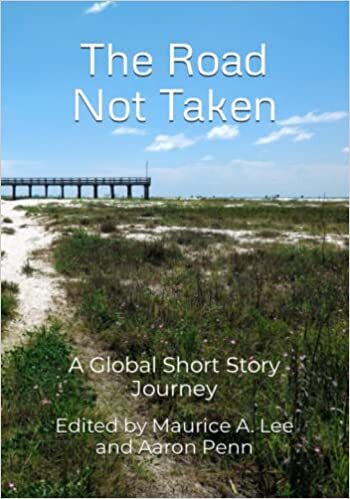
The Road Not Taken: A Global Short Story Journey. Maurice A. Lee & Aaron Penn. USA: Lee and Penn Publishing, 2023.
That's not quite where the story ends, though. I sent the piece printed above to the editor of local literary journal brief shortly after finishing it, and it was accepted for issue 57, which was due to appear in 2021. I even received some proofs to correct, but it has (alas) never materialised.
Given the last issue of brief came out some four and a half years ago, in 2018, I suspect now (I hope I'm wrong) that it never will, and that brief must be added to that illustrious list of New Zealand alternative literary magazines which have now, unfortunately, departed the scene.
I felt that a year and a half was probably long enough to wait before sending it elsewhere. The trouble with that, though, it that it's such a "brief" piece of work, comprehensible within that setting, but a bit too allusive and offbeat for most other editors.
I was, therefore, a bit surprised to receive an email a few days ago informing me of the appearance of the anthology pictured above. I do remember sending them a story a year or so ago, but had no particular expectation of ever seeing it in print.
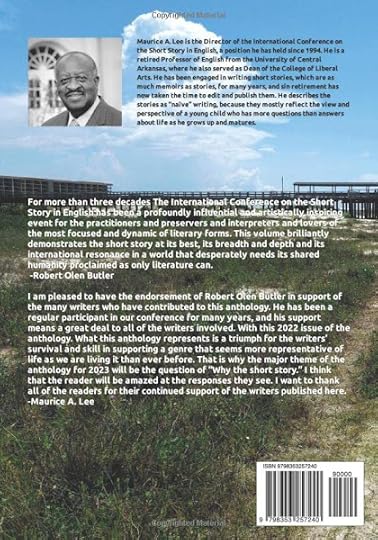
What really astonished me was the title, though. It's not that it's an unfamiliar one. Most people have at least heard of Robert Frost's poem, even if they haven't actually read it. If not, here it is to remind you:
The Road Not Taken
Two roads diverged in a yellow wood,
And sorry I could not travel both
And be one traveler, long I stood
And looked down one as far as I could
To where it bent in the undergrowth;
Then took the other, as just as fair,
And having perhaps the better claim,
Because it was grassy and wanted wear;
Though as for that the passing there
Had worn them really about the same,
And both that morning equally lay
In leaves no step had trodden black.
Oh, I kept the first for another day!
Yet knowing how way leads on to way,
I doubted if I should ever come back.
I shall be telling this with a sigh
Somewhere ages and ages hence:
Two roads diverged in a wood, and I —
I took the one less traveled by,
And that has made all the difference.
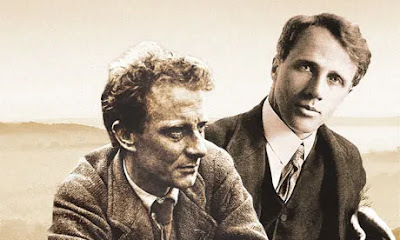 David McCoy: Robert Frost & Edward Thomas (composite image)
David McCoy: Robert Frost & Edward Thomas (composite image)The poem was, according to Frost, written about his friend, fellow-poet Edward Thomas, and his eccentric way of taking a walk.
Thomas chose to go off to war, to the Western Front, where he was killed by a shell on April 9th, 1917. Frost returned to America, where he became probably the most famous and honoured (though also, possibly, the most feared and hated) poet of his generation.
Which of them took the right path? We'll never know.
•
Published on May 01, 2023 13:28
April 22, 2023
Zero at the Bone
 Zero
Zero[all photographs: Bronwyn Lloyd]
i.m. Zero Tolerance Lloyd-Ross
(c. November 2007-21st April 2023)
We're devastated by the loss of our delightful companion Zero, who left this world - hopefully for a better one - on Friday.
I don't really have any words to express how much she's meant to us over the fifteen and a bit years we were privileged to have her with us. Instead, I thought I'd put up some photos of her over the course of her life, together with a few poems I wrote about her during this time.
Hail and farewell, beloved friend. We'll never stop missing you.

•

This is an early piece, written shortly after she first came to us. She was certainly a very spirited kitten! Later on she calmed down a little, but she never ceased to have strong views on a number of issues. It first appeared in the anthology below:
Zero at the bone
The dark looniness
of your leaping
worries me
no pause to reflect
furry paws
outspread
food comfort sleep
combine in
strange parentheses
(just like the town
they found you in
dodging
post-Xmas traffic)
beating up
poor Smudge
before you’d met us
even
now hounding
Otis
forgiving? maybe
needy
certainly
roving emblem
of desire
claws outspread
(12-15/3/08)

Our Own Kind: 100 New Zealand poems about animals. Ed. Siobhan Harvey (Auckland: Godwit, 2009): 67-68.

•

This poem makes Zero sound like a bit of a victim, and it's true that she was bullied from time to time by larger neighbouring cats. She never provoked these fights, but she always gave as good as she got. Later on most of these cats seem to have moved away, so the last few years of her life were almost entirely free of such squabbles. The poem first appeared in Poetry New Zealand Yearbook 2020, edited by Johanna Emeney, and subsequently in the book below:
Zero is lying down today
but little specks of blood
on the bedspread
make me think
she may have run into
one of her twin nemeses
last night
Yellow
a big fat greedy
green-collared glutton
or Brindle
a raccoon-tailed
bully
each of whom
sneaks in the back door
several times a day
to eat her food
she jumps out
hisses at them
but is only a little cat
once or twice we’ve seen
them ganging up on her
unable to help her
unless it’s in plain sight
I suppose that’s it
our little cat
so wilful
cuddly
spirited
has become the thing
we most fear losing
yet cannot safeguard
threaten to crush
with the sheer weight
of our love
(18/1/16-22/10/17)
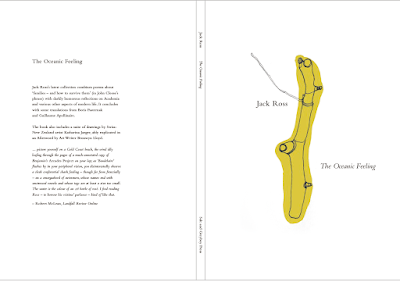
The Oceanic Feeling. Drawings by Katharina Jaeger. Afterword by Bronwyn Lloyd (Auckland: Salt & Greyboy Press, 2021): 21.

•

This poem, written late last year, sounds uncomfortably prophetic to me now. The reference to Andromache's baby Astyanax being frightened by his father Hector's plume is from Homer's Iliad [Bk 6, ll.466-502]. His death at the hands of Achilles' son Neoptolemus is reported in Euripides' Trojan Women [ll.719-25]. The last two lines are a paraphrase of the quote below:
All I want
is for every moment
of every day
to be constant bliss
for Zero
Astyanax cringing
from his daddy’s helmet
safe in his mother’s arms
Andromache
watching enslaved
as Achilles’ son
throws her baby off
the walls
if only I could wish away
fast cars on the road
trespassing neighbour cats
basements with tempting doors
shut after her
lead nailspoison baits
the loss of a furry friend
is the sack of Troy
by the Greeks
(2/9/22-8/4/23)
Someone has said that the death of a mouse by cancer is the whole sack of Rome by the Goths - Ford Madox Ford, The Good Soldier (1915)

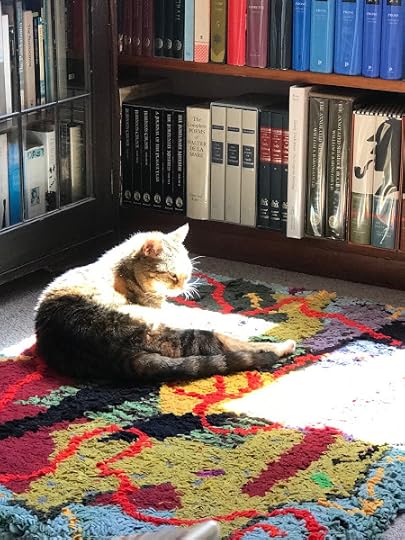
Published on April 22, 2023 21:04
April 2, 2023
SF Luminaries: John Christopher
 The Tripods (1984-85)
The Tripods (1984-85)"John Christopher" - aka Christopher Youd, Samuel Youd (his real name), Hilary Ford, William Godfrey, Peter Graaf, Peter Nichols, William Vine, and Stanley Winchester - is perhaps best remembered for his YA SF series The Tripods, dramatised - rather poorly - by the BBC a couple of decades after the trilogy first appeared.
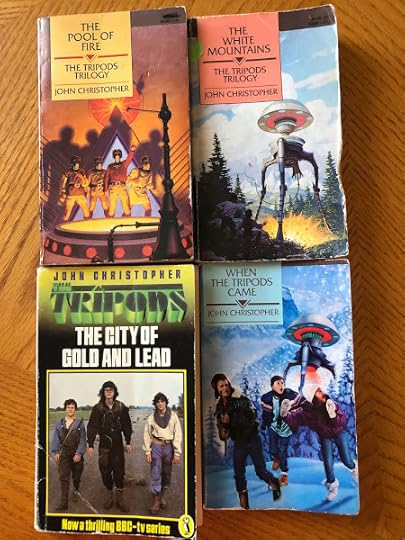 John Christopher: The Tripods Tetralogy (1967-88)
John Christopher: The Tripods Tetralogy (1967-88)Concentrating solely on his 'second life' as a YA author would be to sell him short, though. His earlier adult novels have often been characterised - mostly by people who haven't read them - as imitations of fellow Brit John Wyndham's crossover megahit The Day of the Triffids (1951).
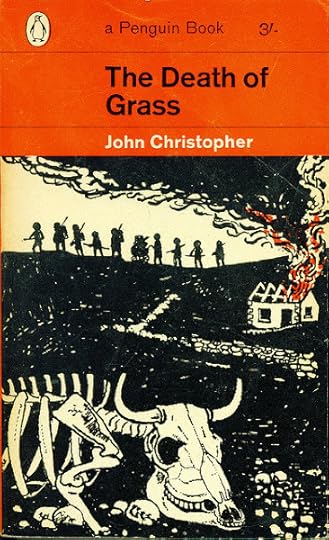 John Christopher: The Death of Grass (1956)
John Christopher: The Death of Grass (1956)This may hold some truth for one or two of them - The World in Winter (1962), for instance - but even the Wyndham-influenced Death of Grass (1956) occupies a distinctly fiercer and more troubled space in the post-apocalyptic landscape than the older writer's "cosy catastrophes" (in Brian Aldiss's phrase). It's this brutal and uncompromising flavour which makes his work particularly relevant to readers today.
 Sam Youd ['John Christopher'] (1922-2012)
Sam Youd ['John Christopher'] (1922-2012)As you'll see from the bibliography here, Youd began writing novels under his own name, then under a succession of other pseudonyms, each tailored to one of his many interests. It was as "John Christopher" that he achieved his greatest commercial (and probably artistic) success, however:
I read somewhere ... that I have been cited as the greatest serial killer in fictional history, having destroyed civilisation in so many different ways – through famine, freezing, earthquakes, feral youth combined with religious fanaticism, and progeria.
- quoted on his Goodreads author page
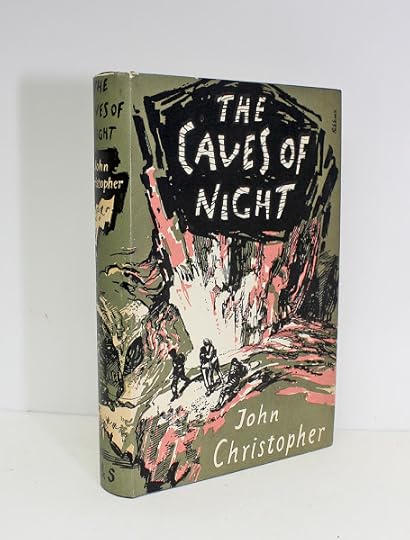 John Christopher: The Caves of Night (1958)
John Christopher: The Caves of Night (1958)These early novels were all thrillers of one type or another, but not all of them can be classified as Sci-fi. The Caves of Night is about a group of amateur speleologists lost in an unknown cave system, and The Long Voyage (which I've discussed in more detail here) describes the strange odyssey of a ship that drifts through the North Sea to the ice-packs of Greenland.
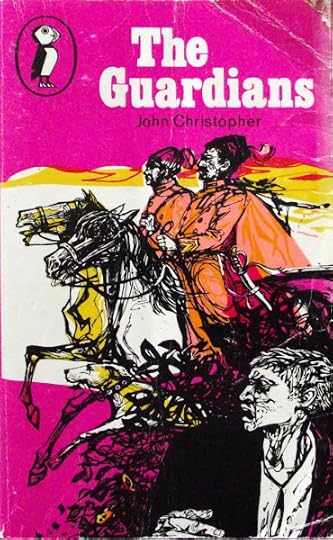 John Christopher: The Guardians (1970)
John Christopher: The Guardians (1970)The first of his novels I myself read was The Guardians. I got it for my birthday one year, and it made an indelible impression on me. There was a sharpness and precision to the writing which I hadn't really encountered before. He didn't seem to pull any punches for his "juvenile" audience. In fact it's clear in retrospect that he found these shorter narrative units particularly suited to his talents.
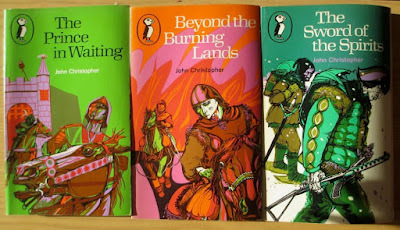 John Christopher: The Prince in Waiting trilogy (1970-72)
John Christopher: The Prince in Waiting trilogy (1970-72)Perhaps the high point of his talent is the brilliantly original - and terrifying - "Prince in Waiting" books. The protagonist Luke was, I think, my very first antihero. Camus's Meursault, Greene's whisky priest, Joyce's Leopold Bloom, none of them surprised me as much as the bitter, scheming, unrepentant hero of these three vividly imagined novels.
After that the temperature of his writing began to cool off a little. Had he gone too far for Puffin Books? Certainly the successors to The Prince in Waiting were mostly one-offs, and the "Fireball" trilogy, when it finally arrived, was a bit of a disappointment.
But then I don't think it really matters where you start with John Christopher. The "adult" novels are not really significantly more demanding - or terrifying - than the children's ones. My favourite of them all remains The Long Voyage - it's the one I keep on coming back to - but I suppose his most dazzling achievement would have to be The Prince in Waiting and its sequels.
Whichever of them you choose to read, though, you certainly won't be wasting your time. He's long outlasted the era he wrote in, and only a few of his books are still in print. They're worth snapping up when you see them, though. I still have a couple of them I'm looking for, but fewer and fewer bookshops now maintain those tatty shelves of SF paperback which used to be such a happy hunting ground for fans like me.
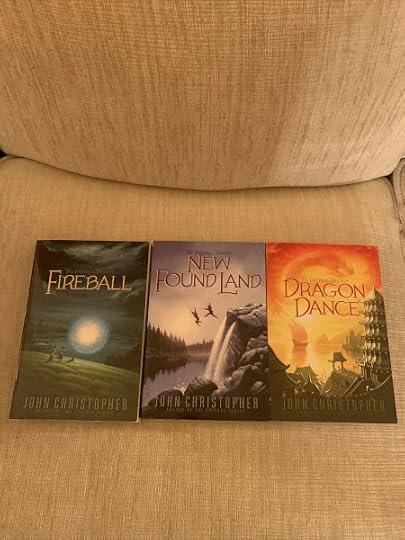 John Christopher: The Fireball trilogy (1981-86)
John Christopher: The Fireball trilogy (1981-86)•
 Sam Youd (1929-2018)
Sam Youd (1929-2018)Sam Youd ['John Christopher']
(1922-2012)
 John Christopher: The Year of the Comet (1955)
John Christopher: The Year of the Comet (1955)Novels:
The Year of the Comet [US: Planet in Peril (1959)] (1955)The Year of the Comet. 1955. London: Sphere Books, 1978. The Death of Grass [US: No Blade of Grass (1957)] (1956)The Death of Grass. 1956. Harmondsworth: Penguin, 1963. The Caves of Night (1958)The Caves of Night. 1958. London: Panther, 1962. A Scent of White Poppies (1959)The Long Voyage [US: The White Voyage] (1960)The Long Voyage. 1960. London: Sphere books, 1986. The World in Winter [US: The Long Winter] (1962)The World in Winter. 1962. Harmondsworth: Penguin, 1964. Cloud on Silver [US: Sweeney's Island] (1964)Cloud on Silver. 1964. Hodder Paperbacks. London: Hodder & Stoughton, 1966. The Possessors (1964)The Possessors. 1964. London: Sphere books, 1978. A Wrinkle in the Skin [US: The Ragged Edge] (1965)A Wrinkle in the Skin. 1965. London: Sphere books, 1978. The Little People (1966)Pendulum (1968)Pendulum. 1968. Hodder Paperbacks. London: Hodder & Stoughton, 1969. Bad Dream (2003)
Short Stories:
The Twenty-Second Century (1954)
YA Fiction:
The Tripods trilogy:The White Mountains. 1967. Rev. ed. (2003)The City of Gold and Lead (1967)The Pool of Fire (1968) The Tripods Trilogy: The White Mountains; The City of Gold and Lead; The Pool of Fire. 1967 & 1968. A Puffin Book. Harmondsworth: Penguin, 1984. The Lotus Caves (1969)The Lotus Caves. 1969. A Puffin Book. Harmondsworth: Penguin, 1971. The Guardians (1970)The Guardians. 1970. A Puffin Book. Harmondsworth: Penguin, 1973. The Sword of the Spirits trilogyThe Prince In Waiting (1970)Beyond the Burning Lands (1971)The Sword of the Spirits (1972) The Prince in Waiting Trilogy: The Prince In Waiting; Beyond the Burning Lands; The Sword of the Spirits. 1970, 1971 & 1972. A Puffin Book. Harmondsworth: Penguin, 1983. In the Beginning. Structural Readers (1972)Dom and Va (1973)Dom and Va. London: Hamish Hamilton, 1973. Wild Jack (1974)Wild Jack. 1974. A Beaver Book. London: Hamish Hamilton Children’s Books, 1978. Empty World (1977)Empty World. 1977. A Puffin Book. Harmondsworth: Penguin, 1981. The Fireball trilogyFireball (1981)Fireball. Fireball Trilogy, 1. 1981. A Puffin Book. Harmondsworth: Penguin, 1984. New Found Land (1983)New Found Land. Fireball Trilogy, 2. 1983. A Puffin Book. Harmondsworth: Penguin, 1984. Dragon Dance (1986)Dragon Dance. Fireball Trilogy, 3. 1986. A Puffin Book. Harmondsworth: Penguin, 1986. When the Tripods Came (1988)When the Tripods Came. 1988. A Puffin Book. Harmondsworth: Penguin, 1990. A Dusk of Demons (1993)A Dusk of Demons. 1993. A Puffin Book. Harmondsworth: Penguin, 1994.
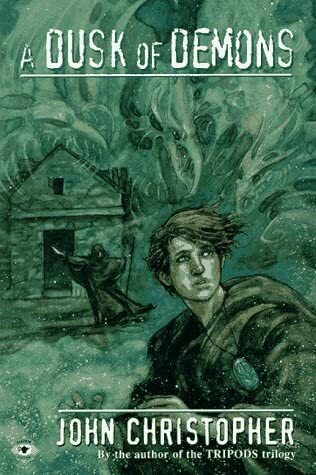 John Christopher: A Dusk of Demons (1993)
John Christopher: A Dusk of Demons (1993)as Christopher Youd:
The Winter Swan (1949)
as Samuel Youd:
Babel Itself (1951)Brave Conquerors (1952)Crown and Anchor (1953)A Palace of Strangers (1954)Holly Ash [US: The Opportunist] (1955)Giant's Arrow [UK: as Anthony Rye] ((1956)The Burning Bird [US: The Choice (1961)Messages of Love (1961)The Summers at Accorn (1963)
as William Godfrey:
Malleson at Melbourne (1956)The Friendly Game (1957)
as William Vine:
"Death Sentence". Imagination Science Fiction (June 1953)"Explosion Delayed". Space Science Fiction (July 1953)
as Peter Graaf:
The Joe Dust Series:Dust and the Curious Boy [US: Give the Devil His Due] (1957)Daughter Fair (1958)The Sapphire Conference (1959) The Gull's Kiss (1962)
as Hilary Ford:
Felix Walking (1958)Felix Running (1959)Bella on the Roof (1965)A Figure in Grey (1973)Sarnia (1974)Castle Malindine (1975)A Bride for Bedivere (1976)
as Peter Nichols:
Patchwork of Death (1965)
as Stanley Winchester:
The Practice (1968)Men With Knives [US: A Man With a Knife] (1968)The Helpers (1970)Ten Per Cent of Your Life (1973)
•
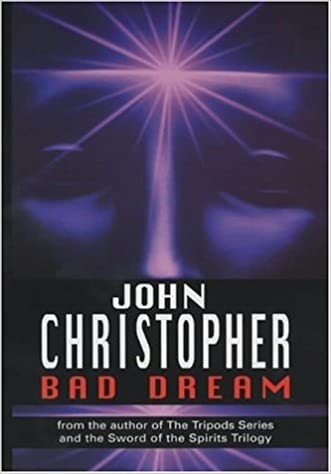 John Christopher: Bad Dream (2003)
John Christopher: Bad Dream (2003)
Published on April 02, 2023 12:25
March 26, 2023
My Favourite Vintage Bookshops: Ponsonby
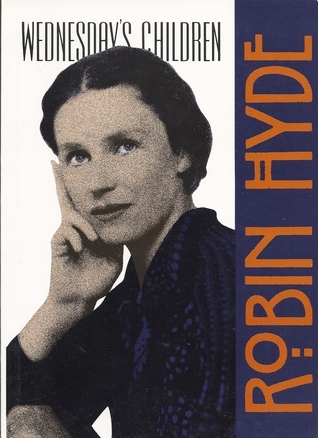 Robin Hyde: Wednesday's Children (1937 / 1993)
Robin Hyde: Wednesday's Children (1937 / 1993)The story is of Wednesday, half-sister of Ronald Gilfillan, a comfortable conforming New Zealander with "a quarter-acre section neatly fenced". Having consulted Madame Mystera, a fortune-teller of Freemans Bay, and been told that fortune, lovers and children are ahead of her, Wednesday takes a ticket in a lottery. She wins £25,000. - Joan Stevens. The New Zealand Novel 1860-1965. 1961. Rev. ed. Wellington: A. H. & A. W. REED, 1966.
[NZETC]
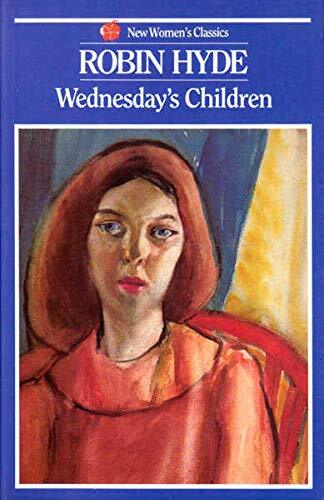 Robin Hyde: Wednesday's Children (1937 / 1989)
Robin Hyde: Wednesday's Children (1937 / 1989)One of the nicest things about Wednesday's Children - for an Aucklander, at any rate - is the vision it provides of our lost city of the past.
I remember, for example, a daring weekend sail in my father's family-sized 16-foot yacht out into the Hauraki Gulf. We ended up landing on the far end of Browns Island, the only portion which can be safely approached from the sea, due to the skein of reefs that surrounds it.
 Motukorea / Browns Island
Motukorea / Browns IslandWe had to scale a fairly steep cliff to emerge out into the open fields, the ones which look so attractive from a distance, but which turned out to be quite swampy when experienced up close.
After that the wind got up, and we couldn't make it back through the outgoing tides at the head of the harbour. We were forced to anchor the yacht off Mission Bay and row our way forlornly by dinghy to shore. My father sailed the boat back to his mooring in Ngataringa Bay next day single-handed.
So when I read about Wednesday Gilfillan's residence on Brown's Island it immediately struck a chord. Mind you, I wouldn't fancy rowing out there in a tiny dinghy on a regular basis - but it's by no means an impossible feat.
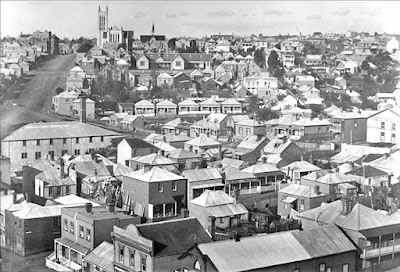 Freemans Bay, Auckland (1900s)
Freemans Bay, Auckland (1900s)And then there's Wednesday's part-time gig as a fortune-teller in Freemans Bay. Robin Hyde's descriptions of its tight-packed streets and working men's houses certainly allow her to channel her inner city-beat reporter. Has it changed much? Profoundly, I fear. Which makes her pen-portrait even more valuable.
It's nice to know that there are still a few vintage bookshops in the glitzy surrounds of Ponsonby / Grey Lynn. How they manage to survive is beyond me. But I suppose there must be enough people out there who savour the unique odour of mould and bookdust to keep them in business. All power to them!
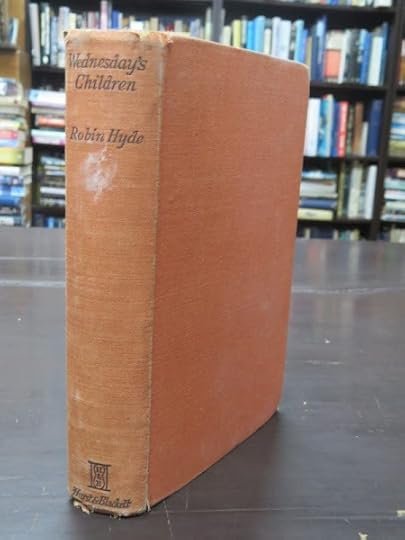 Robin Hyde: Wednesday's Children (1937)
Robin Hyde: Wednesday's Children (1937)•
 The Open Book
The Open BookThe Open Book
[201 Ponsonby Road, Auckland]
I remember once coming up to the counter in this shop with an armful of books, only to be asked: "What is it, exactly, you do?"
I must have looked a bit bemused, so the owner went on to explain that she found it very difficult to square such very disparate purchases with one another.
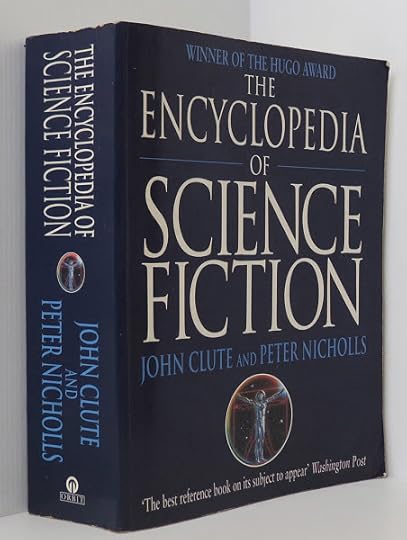 John Clute & Peter Nicholls, ed.: The Encyclopedia of Science Fiction (1999)
John Clute & Peter Nicholls, ed.: The Encyclopedia of Science Fiction (1999)Clute, John, & Peter Nicholls, ed. The Encyclopedia of Science Fiction. 1979. 2nd ed. Contributing Editor Brian Stableford. Technical Editor John Grant. Orbit. 1993. London: Little, Brown and Company (UK), 1999.
I think I had, on that particular day, located a nice paperback copy of John Clute's magisterial Encyclopedia of Science Fiction, to which I was proposing to add a rather sumptuous edition of The Holy Qu'ran:
 The Holy Qur-an: English Translation of the Meanings and the Commentary (1991)
The Holy Qur-an: English Translation of the Meanings and the Commentary (1991)
The Holy Qur-ān: English Translation of the Meanings and Commentary. Ed. Mushaf Al-Madinah An-Nabawiyah. Trans. Abdullah Yusuf Ali et al. Saudi Arabia: King Fahd Holy Qur-ān Printing Complex, A.H. 1411 [= 1991].
"I teach Creative Writing at Massey University" was my rather lame reply. I could see her still shaking her head as I left, though. How could the same person be equally enthusiastic about Science Fiction and the intricacies of Arabic culture?
I remember that one of the kinder reviews I received for my poetry collection Chantal's Book , some twenty years back, referred to me as "a literary magpie, gathering together his shiny objects with a remarkable eclecticism." The author was James Norcliffe, whose recent novel The Frog Prince I've just lately written about for Landfall Review Online . I hope I did it justice.
He did rather hit the nail on the head with that "magpie" analogy, though. I do like to collect pretty objects and ideas and put them together. You could call it mosaic - or even collage - if you were inclined to be charitable. If not, you could simply refer to it as lack of focus.
Never mind, it works for me. "The world is so full of a number of things / I'm sure we should all be as happy as kings" and all that ...
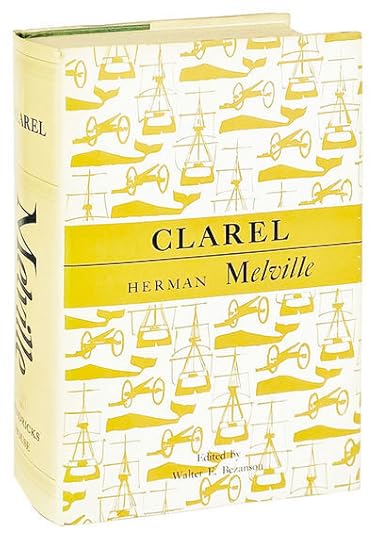 Herman Melville: Clarel: A Poem and Pilgrimage in the Holy Land (1959)
Herman Melville: Clarel: A Poem and Pilgrimage in the Holy Land (1959)Herman Melville. Clarel: A Poem and Pilgrimage in the Holy Land. Ed. Walter E. Bezanson. New York: Hendricks House, Inc., 1960.
The shop has now changed hands. I still find the odd bargain in there, however. The above edition of Melville's Clarel was certainly an exciting addition to my collection of Melvilliana.
I'm still not quite sure why the copy of Tuwhare's Ralph Hotere-illustrated Sapwood and Milk I found there was quite so reasonably priced, but perhaps they're less rare than I thought. In any case, I didn't think about it: just bought it (my motto as a bibliophile).
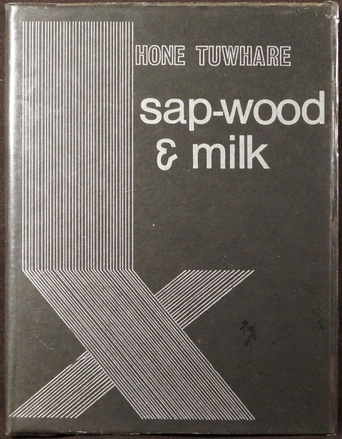
Hone Tuwhare: Sap-wood and Milk (1973)
Hone Tuwhare. Sap-wood and Milk. Illustrated by Ralph Hotere. 629 of 700 numbered copies. Dunedin: Caveman Press, 1973.
•
 Dominion Books
Dominion BooksDominion Books
[230 Jervois Rd, Herne Bay, Auckland 1011]
Many years ago my father used to take me to a second-hand bookshop called "Dominion Books" - not unreasonably, as it was then located on Dominion Road. It was owned by a certain Mrs. Brazier, mother of soon-to-be-famous singer Graham Brazier.
It was a gloomy, fascinating place, full of obscure tomes in almost-unreachable corners. Or at any rate that's my memory of it. I'm not quite sure when she sold the business, which then moved to Jervoise Road in Herne Bay, but I imagine it must have been back in the seventies sometime. Or perhaps the early eighties.
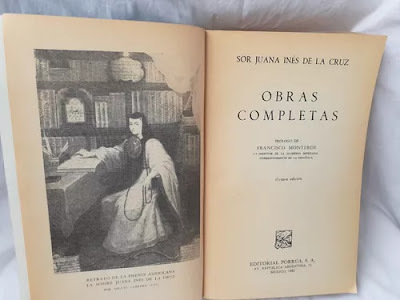 Sor Juana Inés de la Cruz: Obras completas (1969)
Sor Juana Inés de la Cruz: Obras completas (1969)Sor Juana Inés de la Cruz. Obras Completas. 1951-1957. Prólogo de Francisco Monterde. 1969. “Colección Sepan Cuantos …”, 100. Ciudad de México: Editorial Porrúa, S. A., 1977.
So that's the reason for the rather anomalous name of this fascinatingly out-of-the-way shop, which still seems to specialise in obscure treasures hidden in odd corners. Take the book above, for instance. Who on earth would be interested in the complete works - in Spanish - of a seventeenth-century Mexican nun?
Well, me, I'm afraid. My PhD thesis was on Versions of South America in English Literature, which took me all the way from Aphra Behn's Oroonoko (1688) to Kathy Acker's Blood and Guts in High School (1978).
Along the way I spent a lot of time poring over Nobel-prize-winning poet Octavio Paz's classic work on Mexican Culture, The Labyrinth of Solitude (1950). Paz also wrote extensively on Sor Juana de Asbaje - notably in his other great prose work Sor Juana: The Traps of Faith (1982).
This profoundly gifted young polymath, Sor Juana, occupies a position in Mexico somewhat akin to that of Murasaki Shikibu in Japan - or, for that matter, Katherine Mansfield in New Zealand: the one indisputably great, mysterious genius at the heart of an entire literary tradition.
 William Plomer, ed.: Kilvert's Diary (3-1-23)
William Plomer, ed.: Kilvert's Diary (3-1-23)Francis Kilvert. Kilvert’s Diary: Selections from the Diary of the Rev. Francis Kilvert, 1870-1879. 3 vols. Ed. William Plomer. 1940. Rev ed. 1960-61. Illustrated Edition. London: Jonathan Cape, 1977.
Here's another nice purchase from Dominion Books. I have a perhaps unreasonably aversion to abridgements of classic books. It wasn't until I was able to find all three volumes of William Plomer's edition that I could really settle down to reading Kilvert's diary, which I found very entertaining indeed.
 Christopher Ricks, ed.: The Poems of Tennyson (1969)
Christopher Ricks, ed.: The Poems of Tennyson (1969)Christopher Ricks, ed. The Poems of Tennyson. Longmans Annotated English Poets. London & Harlow: Longman, Green and Co, Ltd.. 1969.
This one was the real prize, though. I spent a long time searching for this particular edition of Tennyson, from the Longman Annotated English Poets series. It's true that there's a later, three-volume second edition, but the sheer audacity of including Tennyson's complete poetry in one massive volume was the main reason I had to have this one. And there it was! - one fine day in the poetry section - straight from Bill Pearson's collection, as it turned out.
It is, in other words, always worth having a glance in Dominion Books. The stock there does, admittedly, tend to linger on the shelves, but you never know what might have walked in just the day before ...
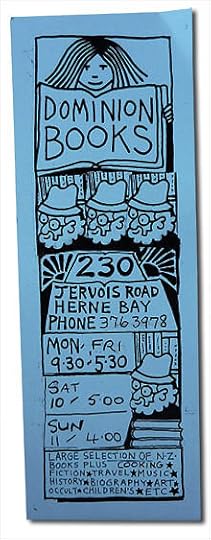 Ink eats Man: Dominion Books (2010)
Ink eats Man: Dominion Books (2010)
Published on March 26, 2023 14:38
March 3, 2023
'Of the Devil's party without knowing it'
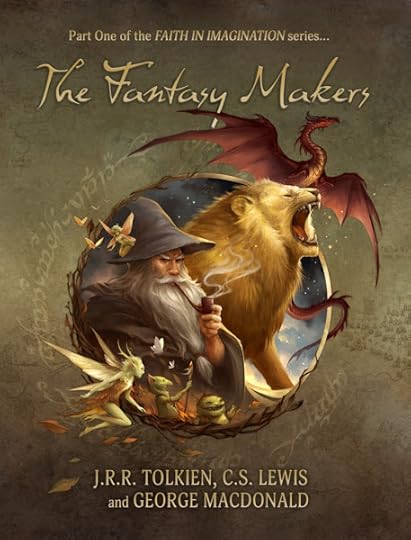 Andrew Wall, dir. & writ.: The Fantasy Makers (2018)
Andrew Wall, dir. & writ.: The Fantasy Makers (2018)The reason Milton wrote in fetters when he wrote of Angels & God, and at liberty when he wrote of Devils & Hell, is because he was a true Poet and of the Devil's party without knowing it.
- William Blake: The Marriage of Heaven and Hell (1790)
Recently Bronwyn and I watched the documentary "The Fantasy Makers", hoping for some insights into the work of George MacDonald and his successors J. R. R. Tolkien and C. S. Lewis. I have to say that it was a somewhat disappointing experience. A succession of non-entities - obscure Academics and writers, none of whom I'd ever heard of - came on screen to proclaim the vital significance of the Christian faith to the works of these three authors, and the various ways in which that old-time religion had jump-started their imaginations.
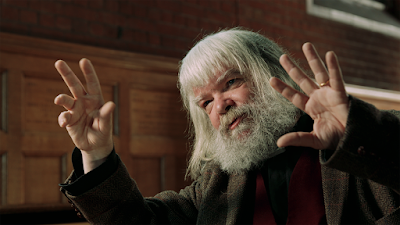 One of the hairier contributors to The Fantasy Makers:
One of the hairier contributors to The Fantasy Makers:Rev Dr A Malcolm Guite of Girton College, Cambridge
Don't get me wrong. This is certainly a defensible proposition: indeed a pretty obvious one, given the tendency of MacDonald and Lewis in particular to incorporate a good deal of Christian allegory and even straightout preaching in their respective fantasy worlds. There's no doubt, either, about the significance of his Catholic faith to J. R. R. Tolkien.
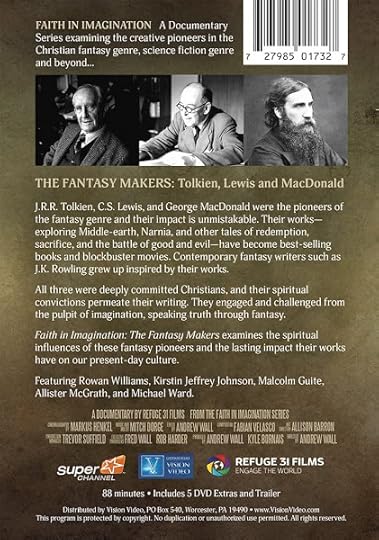 The Fantasy Makers
The Fantasy MakersWhere I part company with this documentary is in its selective - and thus quite misleading - account of the growth of the modern Fantasy genre. It's strongly implied in context that reading MacDonald had a decisive effect on Tolkien - whereas it's really Lewis who was more influenced by him. It's true that The Hobbit is deeply indebted to MacDonald's The Princess and the Goblin, but William Morris's series of heroic romances were the real catalyst for Tolkien's own peculiar fusion of mythology and folktale.
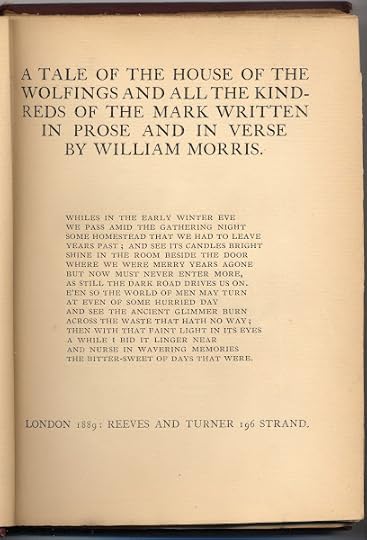 William Morris: The House of the Wolfings (1889)
William Morris: The House of the Wolfings (1889)So why leave out Morris? There were, of course - there always are - limitations of space. You can't put in everyone. In this case, though, there was a simpler reason: he wasn't a Christian. He was, admittedly, brought up as one, but in later life he espoused atheism, along with a very militant form of Communism. He was as independent a thinker as he was a writer and artist.
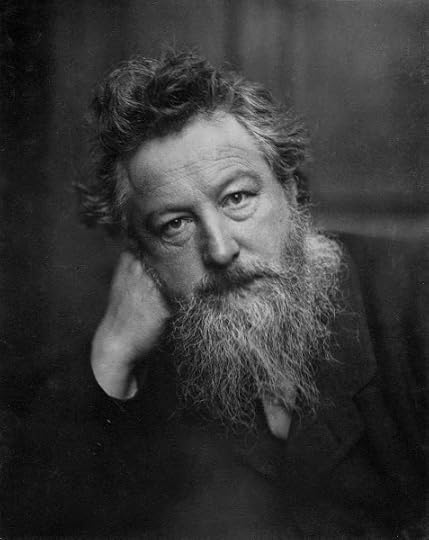 William Morris: William Morris (1834-1896)
William Morris: William Morris (1834-1896)It puts me in mind of an account I once heard of a Children's TV programme which one of my school friends inadvertently found himself watching one idle afternoon. The kids were all sitting around in a circle while the house band, called (I think) the Certain Sounds, performed various uplifting numbers.
This led to a "discussion" (i.e. harangue) where the hosts of the show denounced the excesses of contemporary Rock music - this was, admittedly, the era of Ozzy Osbourne and Black Sabbath - and stressed how wholesome, by contrast, were the songs they'd just been listening to. Those confirmed degenerates the Rolling Stones came in for a bit of a tongue-lashing, too.
All of a sudden a youth leapt up from the floor and shouted "The Rolling Stones are great - and the Certain Sounds are sh ..." They cut to commercial before he could finish what he was saying - but I think the audience got the message. Ah me, the perils of live TV!
When the programme resumed the lone rebel had, of course, been removed - and no doubt taken backstage for indoctrination. But, as the poet Horace once observed: "you can drive out nature with a pitchfork, but still she'll come back" [naturam expelles furca, tamen usque recurret]. His work there was done.
 Top 50 Christian Rock Bands (2015)
Top 50 Christian Rock Bands (2015)The more the speakers in The Fantasy Makers stressed how hip-hop-happening the Bible was, and how deeply it had influenced the whole course of storytelling through the ages, the more I could hear the voice of my sister-in-law trying to persuade the rest of us at one extended-family gathering that Christian Rock was cool, and it was we who were the fuddy-duddies in sticking to more conventional forms of Rock 'n' Roll.
The Bible is undoubtedly a great source of stories, and Tolkien and his friends were very religious, but the intense vehemence with which the assorted talking heads in the documentary asserted these simple truths was in itself enough to make one feel suspicious.
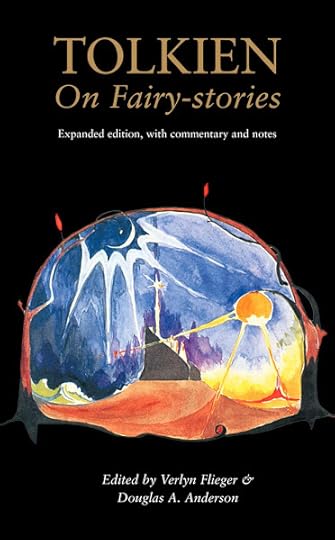 J. R. R. Tolkien: On Fairy-stories (2008)
J. R. R. Tolkien: On Fairy-stories (2008)It was, after all, Tolkien himself who stressed the vital need to make a distinction between the realm of Faerie and its two nearest neighbours, Heaven and Hell. In his classic 1939 essay "On Fairy-Stories", he quotes from the old Border Ballad of Thomas the Rhymer:
O see ye not yon narrow roadHaving first mistaken her for Mary Mother of God, Thomas is inveigled into accompanying the Fairy Queen down the third of these paths, and so:
So thick beset wi' thorns and briers?
That is the path of Righteousness,
Though after it but few inquires.
And see ye not yon braid, braid road
That lies across the lily leven?
That is the path of Wickedness,
Though some call it the Road to Heaven.
And see ye not yon bonny road
That winds about yon fernie brae?
That is the road to fair Elfland,
Where thou and I this night maun gae.
Till seven long years were gone and doneHe brings nothing back with him from this mysterious realm except the ability to make rhymes and music.
True Thomas on earth was never seen.
Mind you, it isn't all good - and there's certainly nothing safe about it. Thomas was lucky to get back home at all: centuries can easily go by in the blink of an eye for those who've been taken away to Faerie. And there is, of course, the little matter of the Devil's teind (or tithe) - a tax of souls enforced by Hell in exchange for allowing this realm to exist independently.
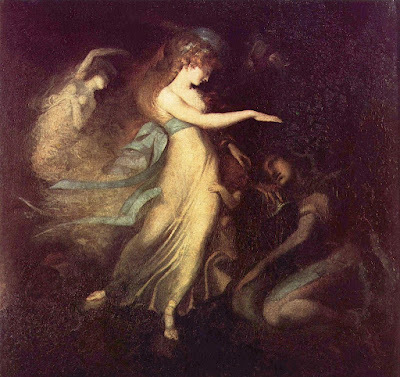 Henry Fuseli: The Faerie Queene (1788)
Henry Fuseli: The Faerie Queene (1788)'Of the Devil's party without knowing it' - well, no, not quite. Tolkien, Lewis, and MacDonald were quite clear in their opposition to that gentleman, witness their respective portraits of him as Morgoth in the Silmarillion (along with his chief lieutenant Sauron in The Lord of the Rings); the Infernal Minister served by civil servant Screwtape in The Screwtape Letters; not to mention the gloomy landlord depicted in MacDonald's introduction to Valdemar Adolph Thisted's Letters from Hell.
It is undeniable, though, that - as a reader - you feel a certain sense of excitement in Tolkien whenever he allows himself to revel in the imagery and atmosphere of the pre-Christian Teutonic heroic age. The story comes to life. In Lewis, too, when he allows his English children entry to a country where fauns and centaurs and the other nature spirits of Classical Paganism are permitted to roam freely.
Milton, according to Blake, "wrote in fetters when he wrote of Angels & God, and at liberty when he wrote of Devils & Hell" - Tolkien, too, could write freely enough of both Middle-earth and Mordor, but when it comes to Valinor and the Blessed Realms, it all just fades off into sunlight and singing.
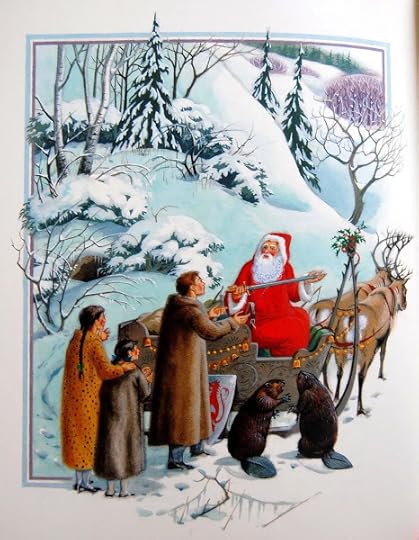 Pauline Baynes: Father Christmas (1950)
Pauline Baynes: Father Christmas (1950)Think, too, of how embarrassing is the sudden appearance of Father Christmas in Lewis's first Narnia book The Lion, the Witch and the Wardrobe. It just seems so jarringly wrong to drag St. Nick into the midst of all these talking animals and powerful magicians. Not even the superbly imaginative Pauline Baynes can do much with this intrusion. But Lewis must have learned from the experience, because he never did anything quite so crass again.
Tolkien detested Lewis's Narnia books precisely because of their imbalance of tone and seriousness. Nymphs and Their Ways: The Love Life of a Faun, the title of one of the raunchier books on Mr. Tumnus's bookshelf, exemplified for Tolkien everything that was wrong about this mish-mash of pagan and contemporary themes.
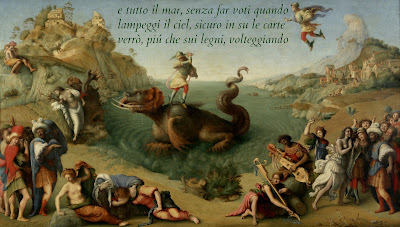 Ludovico Ariosto: Orlando Furioso (1516-32)
Ludovico Ariosto: Orlando Furioso (1516-32)If Ariosto rivalled it in invention (in fact he does not) he would still lack its heroic seriousness. No imaginary world has been projected which is at once so multifarious and so true to its own inner laws; none so seemingly objective, so disinfected from the taint of an author’s merely individual psychology; none so relevant to the actual human situation yet so free from allegory. And what fine shading there is in the variations of style to meet the almost endless diversity of scenes and characters – comic, homely, epic, monstrous, or diabolic!Lewis, by contrast, was careful to praise Tolkien's "heroic seriousness", but suggested that his inventiveness might find a parallel (if not a rival) in Ariosto's Orlando Furioso. Tolkien, characteristically, bristled at the comparison, but one suspects that it was not made idly.
- C. S. Lewis, Blurb for The Lord of the Rings (1954)
Lewis felt, it would seem, that Tolkien was at risk of starting to believe his own ideas about 'sub-creation' - that he was, in effect, within a hair of setting himself up as the god of his own creation. And there is certainly little that's ostensibly Christian about Tolkien's world: its values seem far more firmly based on Old Norse stoicism and blind courage.
Whatever bargain these writers may have struck with their own consciences, it seems clear to me whenever I read them that both Lewis and Tolkien were more in love imaginatively with the Queen of Faerie than they could ever could be with the minutiae of their own religion. That was theology; this was fantasy.
I don't question (or doubt) the sincerity of their faith, just as I don't doubt that of Milton - or Blake, for that matter. I may not share it myself, but I did in my younger days, so have at least some understanding of the mind-set involved.
The creative instinct, however, is an unruly thing: once you start to discipline it and push it in the directions demanded by dogma, you end up with (at best) Hymns Ancient and Modern; at worst, Socialist Realism.
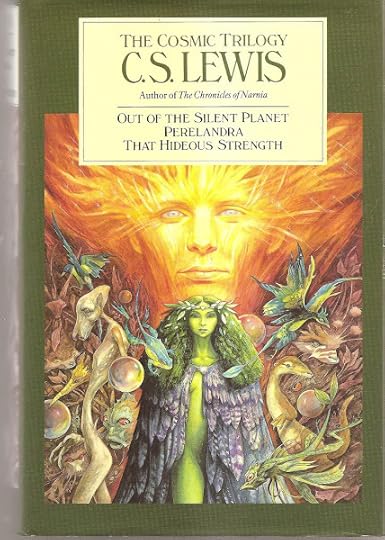 C. S. Lewis: The Cosmic Trilogy (1938-45)
C. S. Lewis: The Cosmic Trilogy (1938-45)The reason, I suspect, that none of the more distinguished commentators on Lewis, Tolkien, and their fellow Inklings - the ones you might have actually heard of - could be persuaded to appear in this rather tin-eared documentary, is that they could see at once that it was attempting to shrink them to the size of mere Christian propagandists.
And yes, on one level, that is what they were - C. S. Lewis, in particular. But you don't have to be a Christian to delight in Out of the Silent Planet or Perelandra, just as The Lord of the Rings cuts across creeds and cultures to engage with real human truths.
Both of them took the road to fair Elf-land, and both paid a certain price for doing so. George MacDonald is a more complex case - his guilt over such lapses from the party-line threatens time and again to overturn his fantasies in mid-course. But the greatness of his narrative gift keeps us reading At the Back of the North Wind and the 'Curdie' books despite any failures of taste or consistency within them.
 The Marion E. Wade Center Museum (Wheaton College, Illinois)
The Marion E. Wade Center Museum (Wheaton College, Illinois)There's a reason why this particular set of seven British authors have been granted their own research centre at a major American university, and it's not because of the orthodoxy of their belief systems:
George MacDonald (1824-1905)G. K. Chesterton (1874-1936)Charles Williams (1886-1945)J. R. R. Tolkien (1892-1973)Dorothy L. Sayers (1893-1957)Owen Barfield (1898-1997)C. S. Lewis (1898-1963)Barfield was an Anthroposophist, Chesterton and Tolkien were Catholics, Lewis and Sayers were Anglicans, MacDonald was probably more of a Unitarian than anything else, and it's very hard to say just what precisely Charles Williams was: he certainly dabbled in magic and occultism more than any of the others.
Where they stand together is in the superreal vividness of their imaginations. Their respective versions of Christian faith may well have been a help in this, but all seven of them had to cast their nets wider than that to write anything worth reading. The details of their individual bargains with Faerie remain sealed up with their bones.
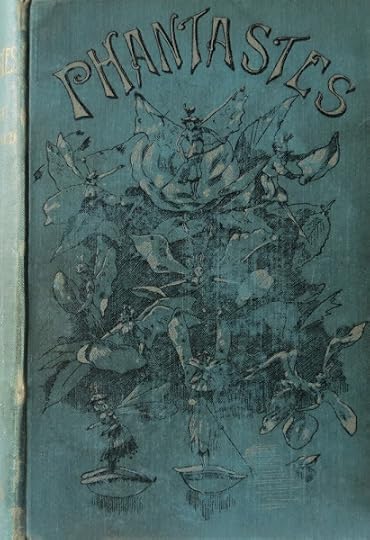 George MacDonald: Phantastes: A Faerie Romance (1858)
George MacDonald: Phantastes: A Faerie Romance (1858)•
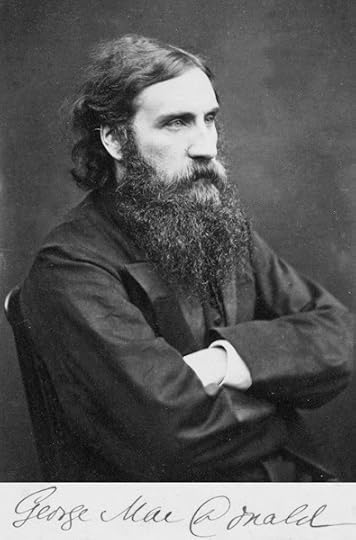 George MacDonald (1860)
George MacDonald (1860)George MacDonald
(1824-1905)
Fantasy:
Phantastes & Lilith. 1858 & 1895. Introduction by C. S. Lewis. Grand Rapids, Michigan: William B. Eerdmans Publishing Company, 1964.At the Back of the North Wind / The Princess and the Goblin / The Princess and Curdie. 1870, 1871, 1882. London : Octopus Books, 1979.The Princess and the Goblin. 1871. Illustrated by Arthur Hughes. A Puffin Book. Harmondsworth: Penguin, 1973.The Princess and Curdie. 1882. Illustrated by Helen Stratton. A Puffin Book. Harmondsworth: Penguin, 1980.The Gifts of the Child Christ: Fairy Tales and Stories for the Childlike. 1882. Ed. Glenn Edward Sadler. 2 vols. Grand Rapids, Michigan: William B. Eerdmans Publishing Company, 1973.The Light Princess and Other Tales: Being the Complete Fairy Tales. Illustrated by Arthur Hughes. Introduction by Roger Lancelyn Green. 1961. Kelpies. Edinburgh: Canongate, 1987.The Complete Fairy Tales. Ed. U. C. Knoepflmacher. Penguin Classics. Harmondsworth: Penguin, 1999.
Novels:
The Marquis of Lossie. 1877. London: Cassell & Co., 1927.
Non-fiction:
'Preface' to Valdemar Adolph Thisted. Letters from Hell. 1866. Trans. Julie Sutter. 1884. London: Macmillan & Co., Ltd., 1911.George MacDonald: An Anthology. Ed. C. S. Lewis. 1946. London: Geoffrey Bles: The Centenary Press, 1947.
Poetry:
MacDonald, George. The Poetical Works. 2 vols. London: Chatto & Windus, 1911.
Secondary:
Raeper, William. George MacDonald. 1987. Herts, England: A Lion Book, 1988.
•
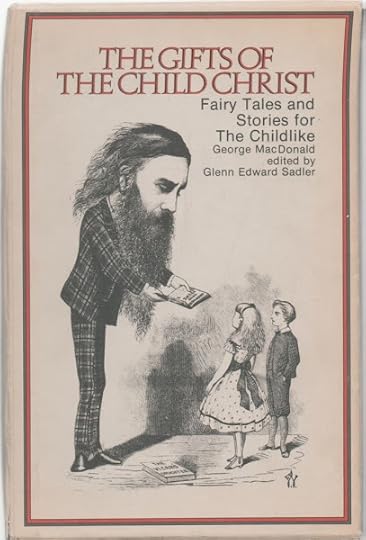 George MacDonald: The Gifts of the Child Christ (1882)
George MacDonald: The Gifts of the Child Christ (1882)
Published on March 03, 2023 14:31
February 17, 2023
The Great Storm
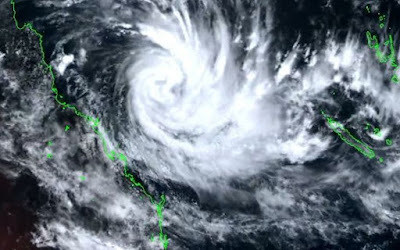 RNZ: Cyclone Gabrielle closes in on Aotearoa (11/2/2023)
RNZ: Cyclone Gabrielle closes in on Aotearoa (11/2/2023)As we start to settle into - hopefully - the cleanup and recovery from the floods and other ravages of Cyclone Gabrielle here in the North Island, it got me to thinking about some of the great storms of literature.
Flooding in Mairangi Bay
[photography: Bronwyn Lloyd (27/1/2023)]
's Typhoon, yes, most people have heard of that, but there are some other equally impressive ones which may be less familiar.
There's 's pioneering piece of journalism recording the progress of the great storm of 1703, for instance - or the shipwreck at Yarmouth in 's David Copperfield. and are two seafaring authors who appear to have set out deliberately to challenge Conrad at his own game.
And then, to mention a couple of more recent examples, there's British Sci-fi writer 's The Long Voyage, an intense and poetic narrative of a ship lost at sea; not to mention (to bring things full circle) the evocation of the UK's great storm of 1987 - which I remember well - at the end of 's Possession: A Romance.
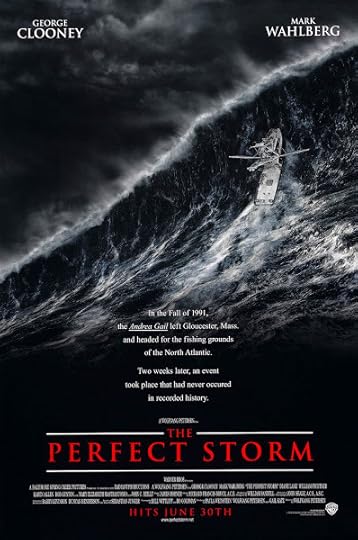 Wolfgang Petersen, dir. The Perfect Storm (2000)
Wolfgang Petersen, dir. The Perfect Storm (2000)Sebastian Junger. The Perfect Storm: A True Story of Men Against the Sea. 1997. London: Fourth Estate, 1998.
•
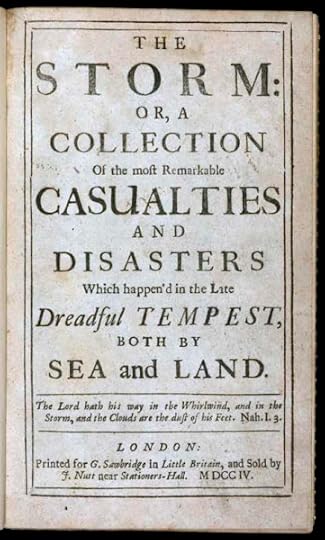 Daniel Defoe: The Storm (1704)
Daniel Defoe: The Storm (1704)The Storm
(1704)
Daniel Defoe. The Storm. 1704. Ed. Richard Hamblyn. London: Allen Lane, 2003.
Daniel Defoe was certainly a man for firsts: the first major English novel, Robinson Crusoe (1719); the first substantive non-fiction novel, or 'faction': Memoirs of a Cavalier (1720); and the first 'substantial piece of modern journalism', The Storm, his blow-by-blow account of the great storm of 1703, compiled from numerous eye-witness accounts.
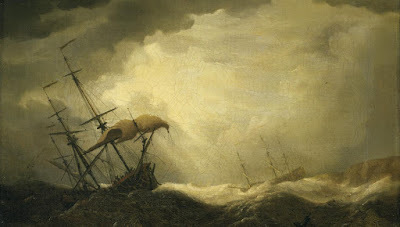 The Great Storm of 1703
The Great Storm of 1703It was, as he described it, "The Greatest, the Longest in Duration, the widest in Extent, of all the Tempests and Storms that History gives any Account of since the Beginning of Time. ... No pen could describe it, nor tongue express it, nor thought conceive it unless by one in the extremity of it."
Most People expected the Fall of their Houses. ... Whatever the Danger was within doors, 'twas worse without; the Bricks, Tiles, and Stones, from the Tops of the Houses, flew with such force, and so thick in the Streets, that no one thought fit to venture out, tho' their Houses were near demolish'd within.Defoe's book may, unfortunately, have been a bit ahead of its time, given its poor sales, but it remains a lively read, and certainly anticipates the skill with which he would blend factual details with fiction in later works such as the classic Journal of the Plague Year (1722).
- Daniel Defoe, The Storm. 1704. The Novels and miscellaneous works of Daniel Defoe. 6 vols. London: Henry G. Bohn, 1855. vol. 5: 260-421.
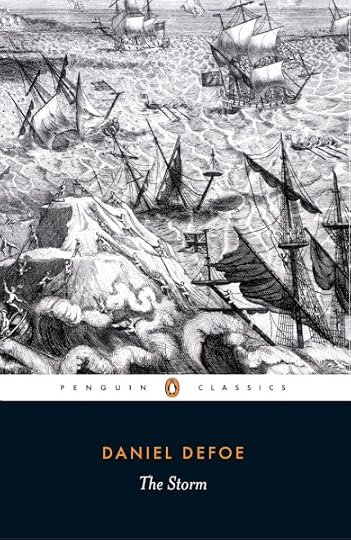 Daniel Defoe: The Storm: An Essay (2005)
Daniel Defoe: The Storm: An Essay (2005)•
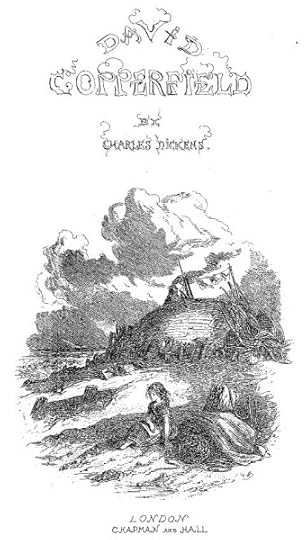 Phiz: Frontispiece to David Copperfield (scanned by Philip V. Allingham)
Phiz: Frontispiece to David Copperfield (scanned by Philip V. Allingham)David Copperfield
(1850)
Charles Dickens. The Personal History of David Copperfield. 1850. Ed. Trevor Blount. Penguin Classics. 1966. Harmondsworth: Penguin, 1985.
Here are Charles Dickens's original notes for the 18th monthly part of his most personal and, indeed, largely autobiographical novel David Copperfield, serialised from May 1849 to November 1850 by his London publishers Bradbury & Evans:
Ham and Steerforth. Steerforth in a sinking shipThe co-authors of Dickens at Work, the first book to give close attention to the 'notes-to-self' number plans which have survived for some (not all) of his novels, comment thus on his preparations for the portrayal of the great Yarmouth storm:
in a great storm off Yarmouth Roads. Ham goes
off in a life boat, - or with a rope around his waist? -
through the surf. Both Bodies washed ashore together?
No.
a mighty wind.
- John Butt & Kathleen Tillotson, Dickens at Work. 1957. London & New York: Methuen & Co., 1982: 168.
No scene in the book was given such careful presentation as the storm scene. ... The labour involved ... is conveyed in a letter to Forster of 15 September: 'I have been tremendously at work these two days', he writes; 'eight hours at a stretch yesterday, and six hours and a half today, with the Ham and Steerforth chapter, which has completely knocked me over'. Two days later he told Wills that the 'most powerful effect in all the Story is still on the Anvil'. Thus the writing of this chapter occupied at least four days. [170]
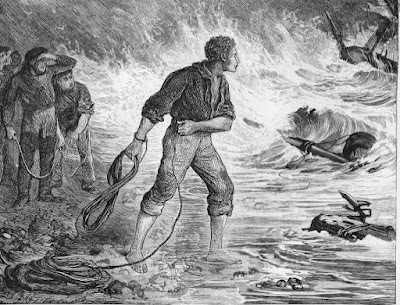 Fred Barnard: The Storm (1872)
Fred Barnard: The Storm (1872)Portraying this scene adequately seems to have been a bit too much for the matter-of-fact Phiz, his usual illustrator, so it wasn't till Fred Barnard provided some new pictures for Chapter LV, "Tempest," in the posthumous Household Edition of David Copperfield, that any real attempt was made to show Ham Peggotty preparing to swim out to the wreck in an effort to save the unfortunate souls left aboard.
It certainly seems preferable to Harry Furniss's later version, below, of the 'the last parting' between David and Steerforth - "he was lying easily with his head upon his arm": the one detail Dickens marked "To remember" in the number plan for this chapter.
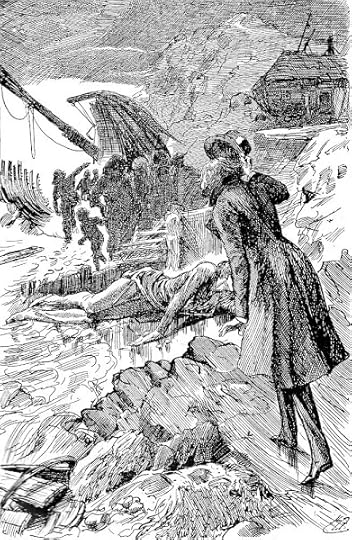 Harry Furniss: The End of Steerforth (1910)
Harry Furniss: The End of Steerforth (1910)•
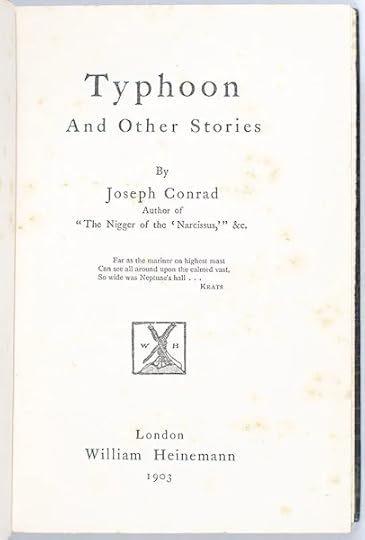 Joseph Conrad: Typhoon and Other Stories (1903)
Joseph Conrad: Typhoon and Other Stories (1903)Typhoon
(1903)
Joseph Conrad. Typhoon and Other Stories. 1903. Penguin Modern Classics. Harmondsworth: Penguin, 1970.
Joseph Conrad's great novel Lord Jim (1900) hinges on an emergency at sea: not a storm, but a collision between a pilgrim ship bound to Mecca and some kind of floating debris, possibly an entire submerged ship floating just below the surface of the water.
The main character Jim's failure to measure up to the disaster dictates, inexorably, the rest of the tragic action of the story.
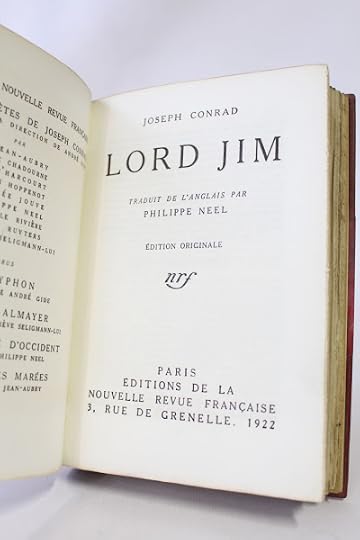 Joseph Conrad: Lord Jim (1900)
Joseph Conrad: Lord Jim (1900)One can't help feeling, though, that Conrad may have thought that he'd missed a trick by not including, in Lord Jim, the sheer unbridled energy of a Pacific typhoon (the same thing as a hurricane, essentially, except that different names are used for these storms in the Atlantic and the Pacific).
"Typhoon" is not exactly a light-hearted work: it portrays a state of things so far beyond the normal expectation of what might happen, even at sea, that it can literally drive people insane. Nevertheless, it's true to say that it showcases Conrad's trademark irony rather more centrally than Lord Jim.
Just as Jim's romantic illusions about life are the crucial factor that destroys him, so Captain MacWhirr's complete lack of imagination is the thing that saves him and his crew from the immeasurable devastation of the storm. MacWhirr understands objectively that his ship might sink, but he cannot really see it in his mind's eye.
It therefore never occurs to him to do anything but continue with the normal business of the voyage. And so, bizarrely, he and most of the others are saved.
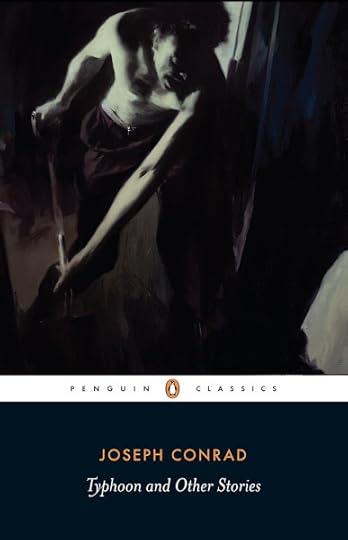 Joseph Conrad: Typhoon and Other Stories (1903)
Joseph Conrad: Typhoon and Other Stories (1903)•
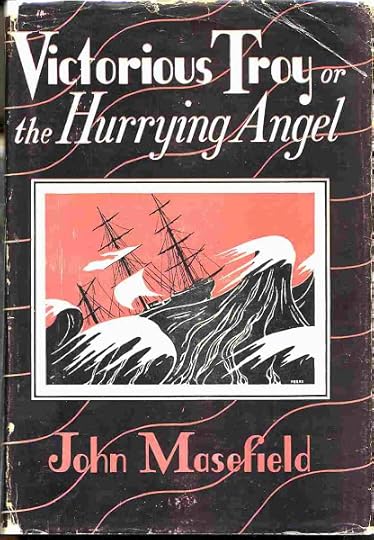 John Masefield: Victorious Troy (1935)
John Masefield: Victorious Troy (1935)Victorious Troy
(1935)
John Masefield. Victorious Troy, or The Hurrying Angel. 1935. London: William Heinemann Ltd., 1935.
A Long time ago I wrote a Masters' thesis about the novels of English Poet Laureate John Masefield - or, rather, his early novels: he wrote 23 of them in all.
Victorious Troy is one of the later ones, and one of the few to be focussed entirely on the sea.
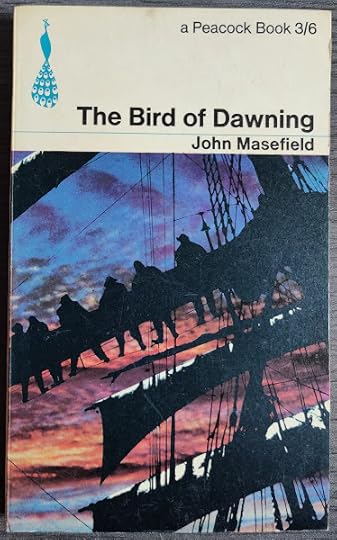 John Masefield: The Bird of Dawning (1933)
John Masefield: The Bird of Dawning (1933)The first of his purely 'seafaring' novels, The Bird of Dawning :
... is the remarkable story of a crew and the principal hero, Cruiser Trewsbury, between shipwreck and triumph. When their clipper, participant of the annual tea race from China to London, sinks on its home journey, Cruiser takes command of the only boat which escapes the disaster. A gruelling journey of 700 miles across the Atlantic in an open boat awaits the small crew. The discovery, soon to be made, that they have an insufficient quantity of both water and food on board, dashes all hopes. Passing ships which fail to spot the shipwrecked and sharks greedily approaching the boat contribute to the picture of doom. By remarkable circumstances, however, they discover a ship, one of the other tea clippers, drifting on the sea with its crew gone. With the crew back in the race for the coveted price of being the first tea clipper of the season to dock in London ...The book includes a marvellous set-piece passage describing the effects of a single great wave on a ship at sea. Perhaps it was this that persuaded Masefield to go the whole hog and devote an entire novel to the description of a great storm.
Victorious Troy, published two years later, is:
... Set during the grain race of 1922. ... The ship from which the novel gets its title is struck by a cyclone in the South Pacific and it is Dick Pomfret, the senior apprentice, who valiantly saves the vessel.It's certainly far more detailed than "Typhoon", but lacks the latter's focus and psychological acuity. As an unabashed adventure story and rattling good yarn, though, it's well worth reading by those addicted to the likes of C. S. Forester and Patrick O'Brian.
- Philip W. Errington, John Masefield: The "Great Auk" of English Literature. A Bibliography. London: The British Library / New Castle, DE: Oak Knoll Press, 2004: 420.
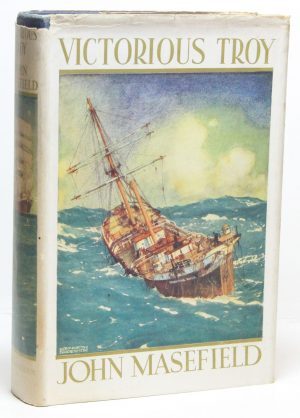 John Masefield: Victorious Troy (1935)
John Masefield: Victorious Troy (1935)•
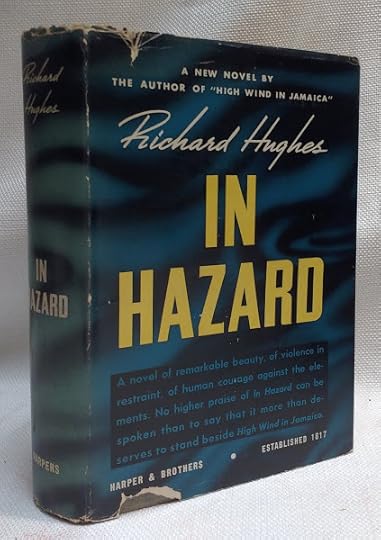 Richard Hughes: In Hazard (1938)
Richard Hughes: In Hazard (1938)In Hazard
(1938)
Richard Hughes. In Hazard. 1938. London: Chatto & Windus, 1948.
In 1932 the Phemius, a Holt Line steamship, was caught in a hurricane for six days. Hoping that his captain’s report could be turned into something, the chairman of the shipping line sent a copy to Masefield and then to Hughes, whose first novel, A High Wind in Jamaica, had been set at sea. In 1938 Hughes used the incident as the basis for In Hazard, his second novel.Once again, this is a case of an author who'd had great success with one description of a storm or a shipwreck, deciding to extend the trope into a complete work of fiction.
- Richard Hughes, "Securing the Hatches". Lapham's Quarterly (1929)
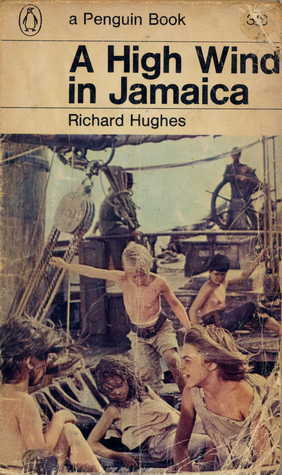 Richard Hughes: A High Wind in Jamaica (1929)
Richard Hughes: A High Wind in Jamaica (1929)The account of a hurricane at the beginning of A High Wind in Jamaica is justly famous: impossible to forget, in fact. The rest of the novel takes a completely different tack into the psychology of young children left up to their own devices - in a manner somewhat prophetic of Golding's Lord of the Flies - and is also very successful in its own way, but the novel as a whole does seem to separate into these two disparate parts.
In Hazard is not so famous. In fact, the only reason I've actually read it is because I happened to pick up a battered second-hand paperback copy when I was in my teens. It's been damned with descriptions such as "allegorical of the Second World War" or "limited in its range", but I suspect the most of these comments come from people unfamiliar with it.
It may be because I've read it so many times that I practically know it by heart, but it still seems to me a staggeringly good novel. The storm it describes is apocalyptic, seemingly incredible, and yet - based entirely on an actual event, as the quote above records.
It is by far my favourite book among the very few that Richard Hughes gave us. He, too, seems to me a severely underrated writer, who definitely deserves resurrection. There's a good biography by Richard Perceval Graves, published in 1994.
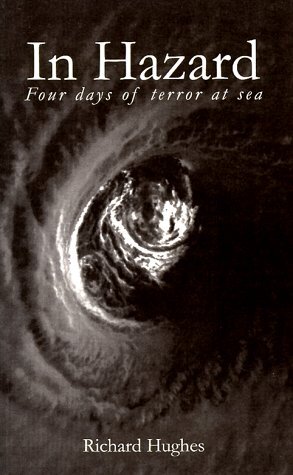 Richard Hughes: In Hazard (1998)
Richard Hughes: In Hazard (1998)•
 John Christopher: The Long Voyage (1960)
John Christopher: The Long Voyage (1960)The Long Voyage
(1960)
John Christopher. The Long Voyage. 1960. London: Sphere Books, 1986.
Before he became the beloved author of such YA classics as the Tripod books and The Prince in Waiting trilogy, "John Christopher" (whose real name was Samuel Youd) was mainly known for a series of grim survival stories, some SF, some not, more or less in the mode of John Wyndham and the early J. G. Ballard.
 John Christopher: The World in Winter (1962)
John Christopher: The World in Winter (1962)The World in Winter and The Death of Grass are probably the best known of these. Both are uncompromisingly pessimistic, and (indeed) would fit more comfortably into contemporary lists of post-apocalyptic literature than they did into the literary landscape of the 1950s and 60s.
He was by no means a one-note writer, however, and The Long Voyage (known in the US as The White Voyage) is probably my favourite among all of his books.
It depicts a long struggle for survival by a few passengers and crew left on a derelict ship in the North Sea as it drifts ever northwards towards the Arctic Circle. The Shackleton-like spirit displayed by the Captain and (to a lesser extent) by his First Mate is balanced by the careful character depiction of the less heroic others.
It's hard to describe why the result seems imbued with such precision and truth. It's one of those rare novels I always feel like rereading the moment I finish it. It has a curious depressing charm which I can only compare to Philip Larkin's equally bleak A Girl in Winter, a dark background against which the few moments of epiphany shine out with surprising depth.
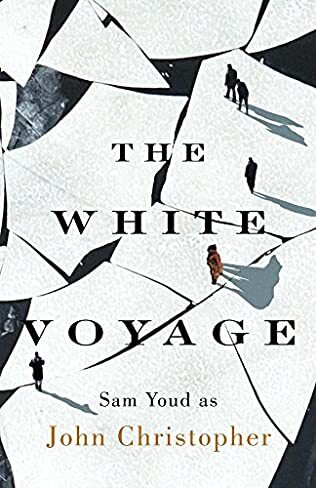 John Christopher: The White Voyage (1960)
John Christopher: The White Voyage (1960)•
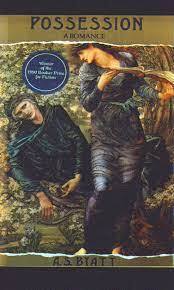 A. S. Byatt: Possession (1990)
A. S. Byatt: Possession (1990)Possession
(1990)
A. S. Byatt. Possession: A Romance. 1990. London: Vintage, 1991.
The Great Storm of 1987 is one of the worst recorded weather events in British history, claiming 18 lives in the UK and uprooting 15 million trees. ...In the late 1980s I was living in the UK, as I worked on my Doctoral thesis at the University of Edinburgh. I didn't have much access to news, as the television room in my local Halls of Residence seemed to be perpetually occupied by darts fans who resented any attempt to change the channel. But even I was aware of the great storm of 1987.
During a lunchtime weather broadcast, in a moment which proved pivotal to the public's perception of the coming storm, the BBC's Michael Fish made an offhand comment which was misunderstood to mean there was no hurricane coming.
The storm then hit in the early hours before dawn with a ferocity which no one had been prepared for, ripping through the country from the west near Cornwall and advancing with every hour ...
Though it mostly affected the south of England rather than Scotland, where I was based, I can still remember those images of whole forests of downed trees. For a dendrophile such as myself, the sight was particularly devastating.
 The Great Storm of 1987 (2022)
The Great Storm of 1987 (2022)Years later, when I read the sensation of the season, A. S. Byatt's Booker-Prize winning novel Possession, I was very impressed by the way in which she managed to weave the great storm into her preposterously entertaining tale of two nineteenth-century poets' hidden affair, and the nefarious attempts by various scholars to steal all the details for their own devious purposes - a dastardly scheme foiled finally by our two present-day heroes.
The novel has been described as "historiographic metafiction", and it gave rise to a whole slew of - mostly less succcessful - imitations. There was, however, a wonderful serendipity in reading it in 1990 as an obscure graduate student, like Roland Michell in the novel, and to feel the part-fictional, part-truthful events rhyming one by one with my own lofty fantasies of Academic success.
It's hard to avoid the conclusion that Byatt was influenced by David Copperfield in her decision to set the denouement of her novel during a great storm. But then, who wasn't she influenced by? Her novel may seem less unusual now, thirty years on, given it's been so often emulated, but it remains a wonderful yarn, and certainly one I would recommend to anyone who's not yet encountered it.
At all costs ignore the horribly bad movie adaptation, though.
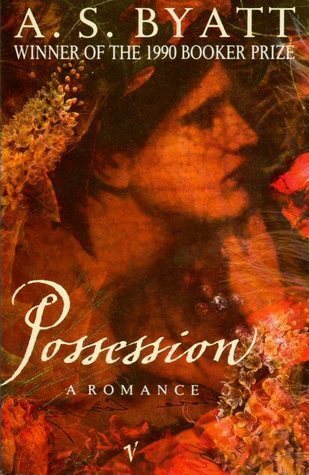 A. S. Byatt: Possession (1990)
A. S. Byatt: Possession (1990)•
 @MonteChristoNZ/via REUTERS: Auckland Floods (31-1-2023)
@MonteChristoNZ/via REUTERS: Auckland Floods (31-1-2023)So will what we've just experienced here in New Zealand go down in history as the great storm (or storms) of 2023? It seems very probable. It's hard to avoid the thought that both the weather forecasters and the civil defence authorities were to blame in not reacting more quickly to the events of Frday 27th January, but they certainly tried to make up for the deficiency in their warnings about Cyclone Gabrielle.
No doubt there are many more lessons for the future to be learnt from all this. For the moment, though, our concentration has to be on starting to repair as much as possible of the damage that's been done. And to mourn for the dead.
 Brett Phibbs: Colwill Road, Massey (5/2/2023)
Brett Phibbs: Colwill Road, Massey (5/2/2023)
Published on February 17, 2023 13:44

